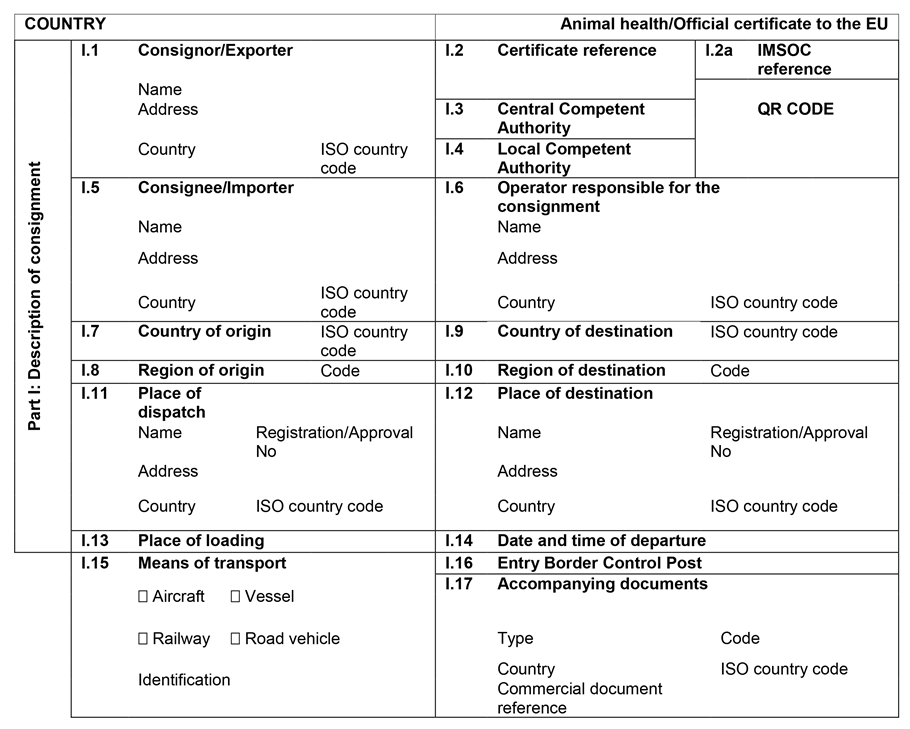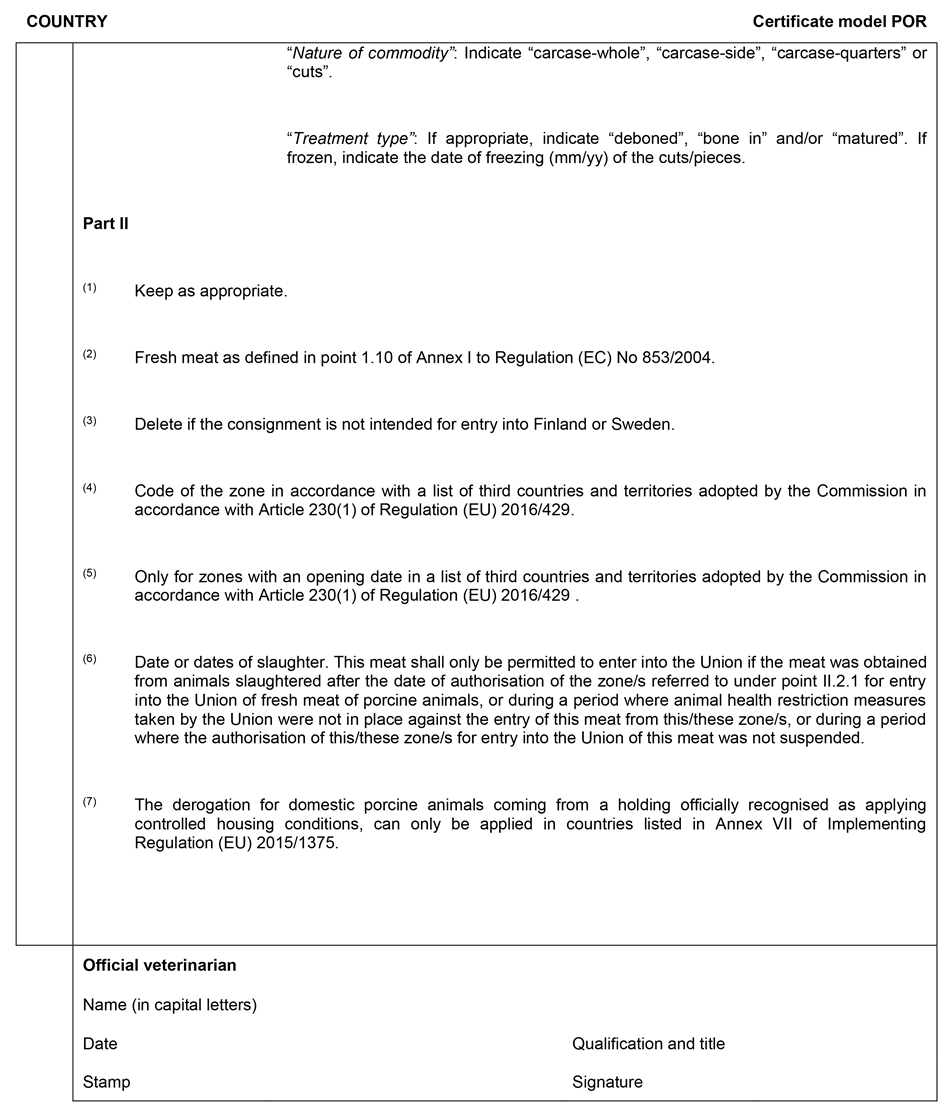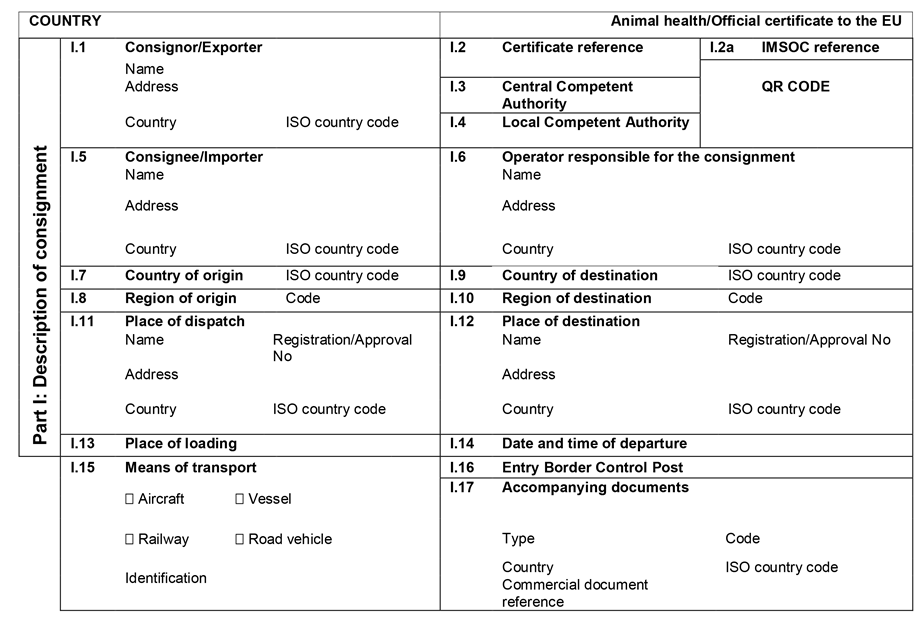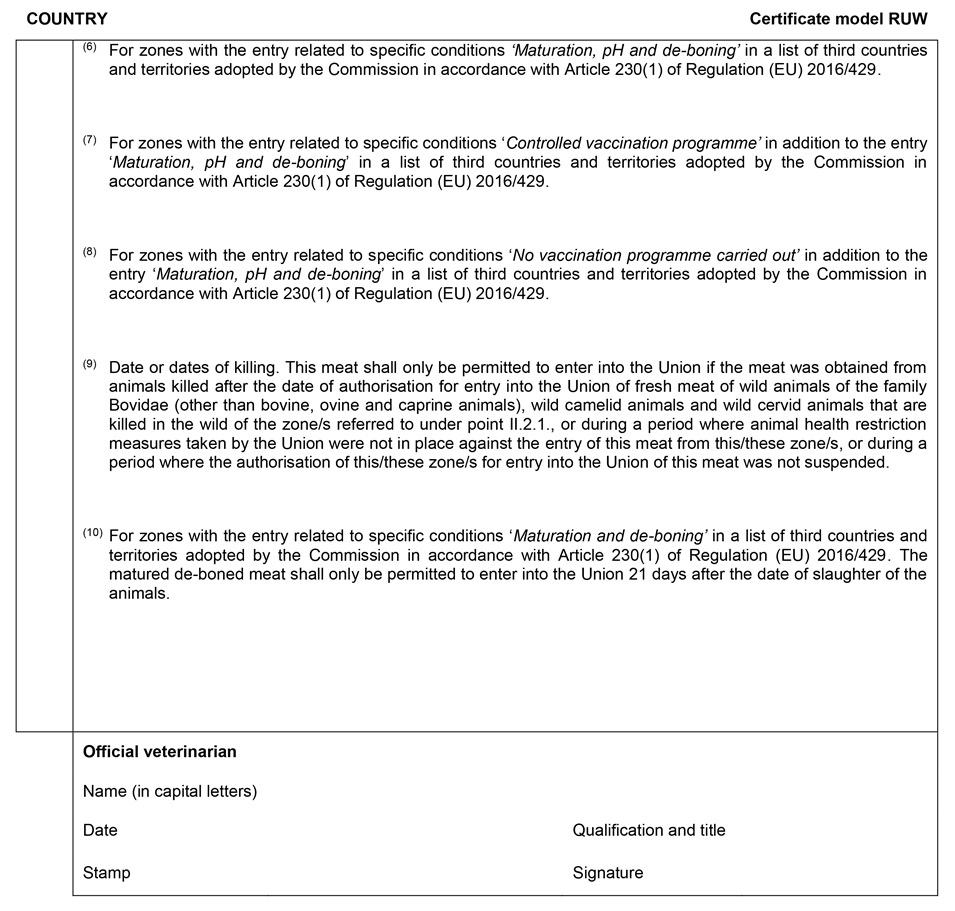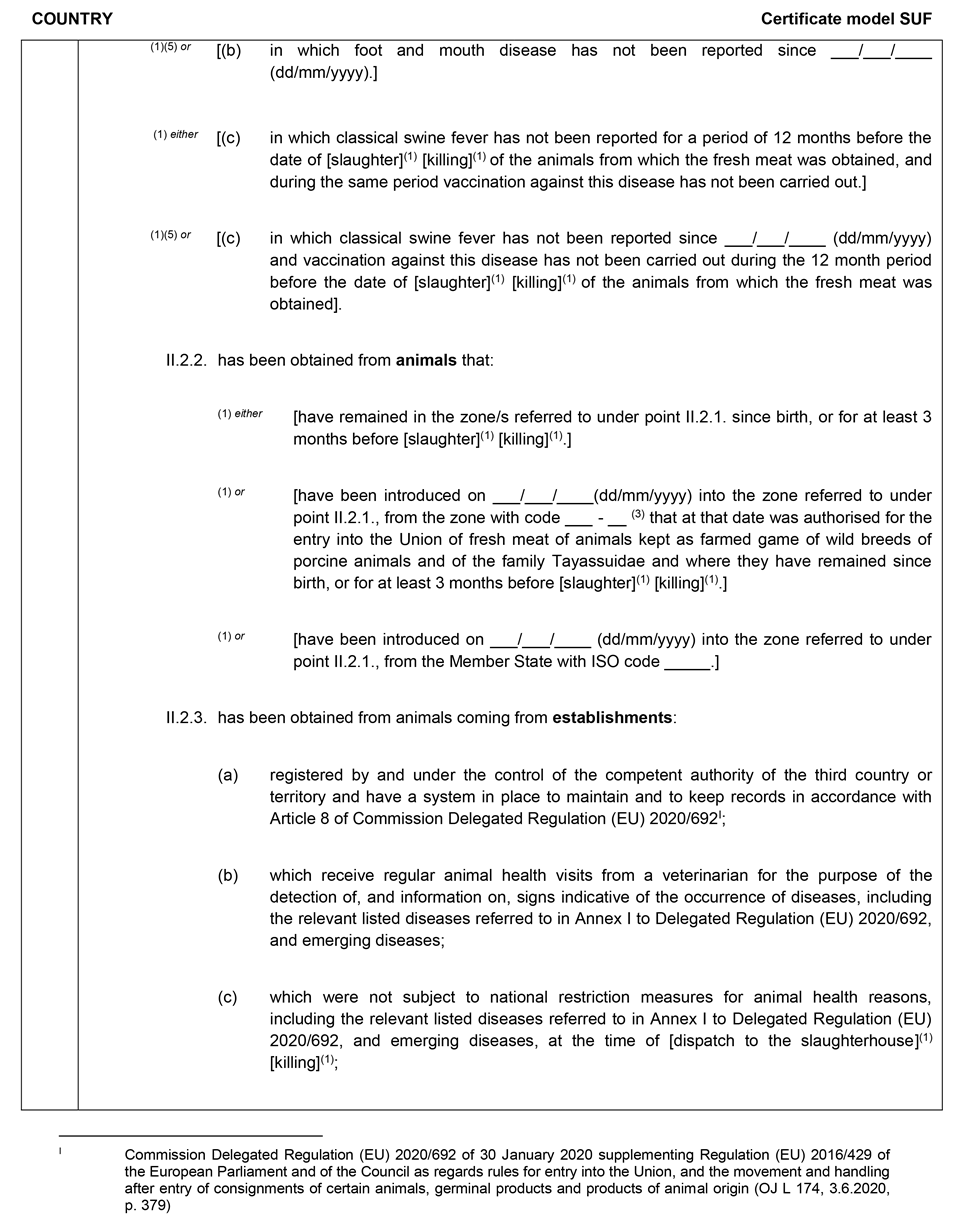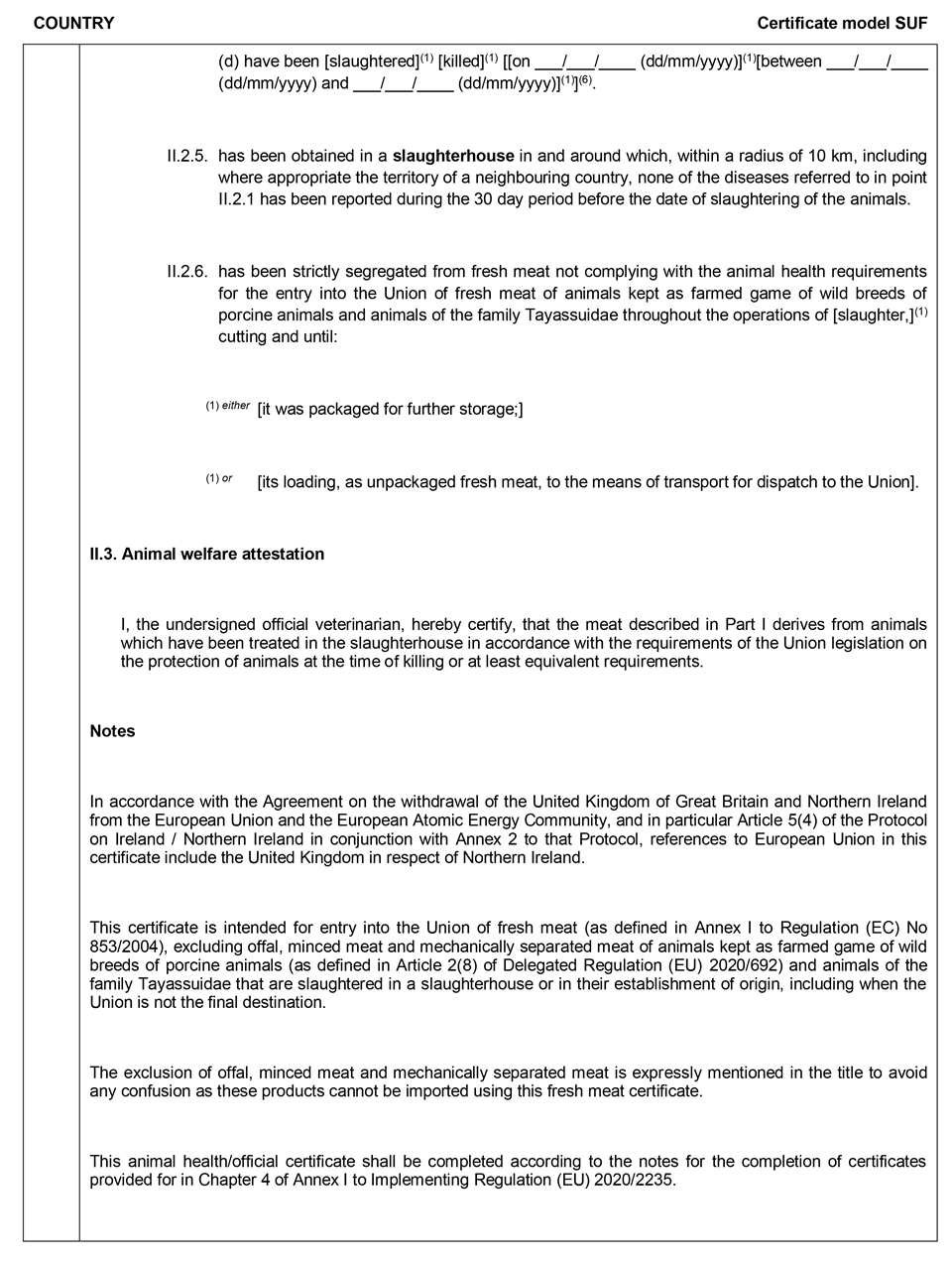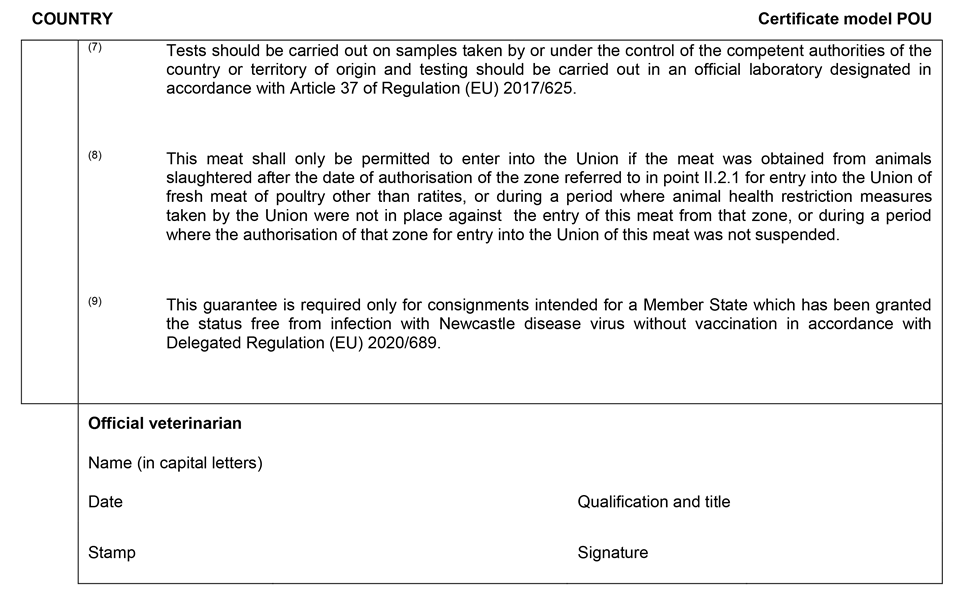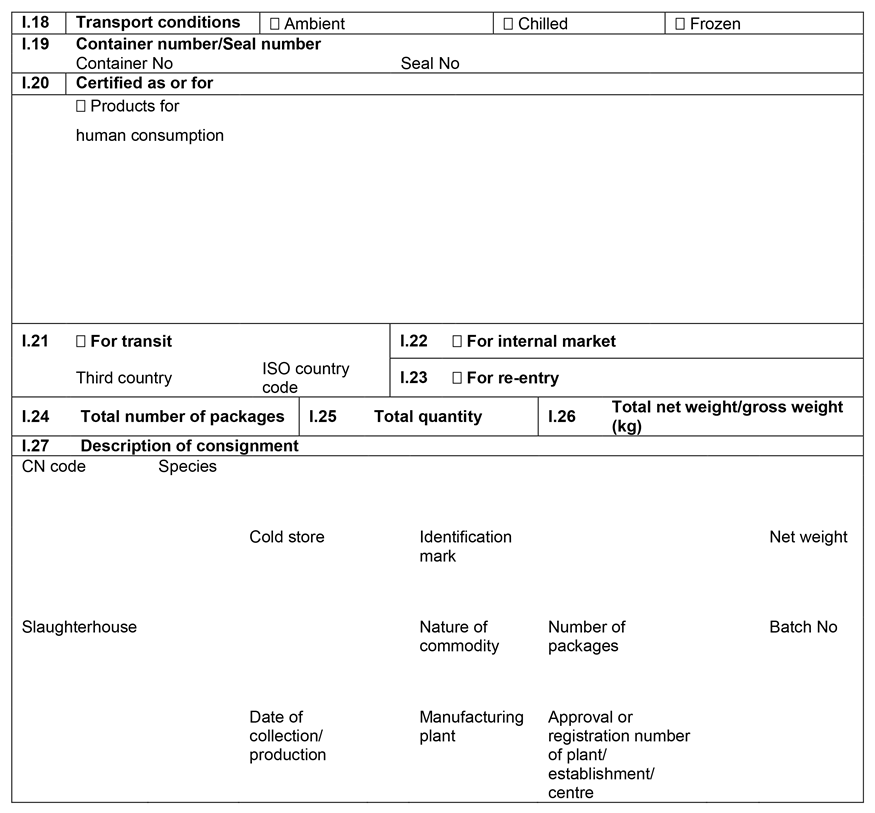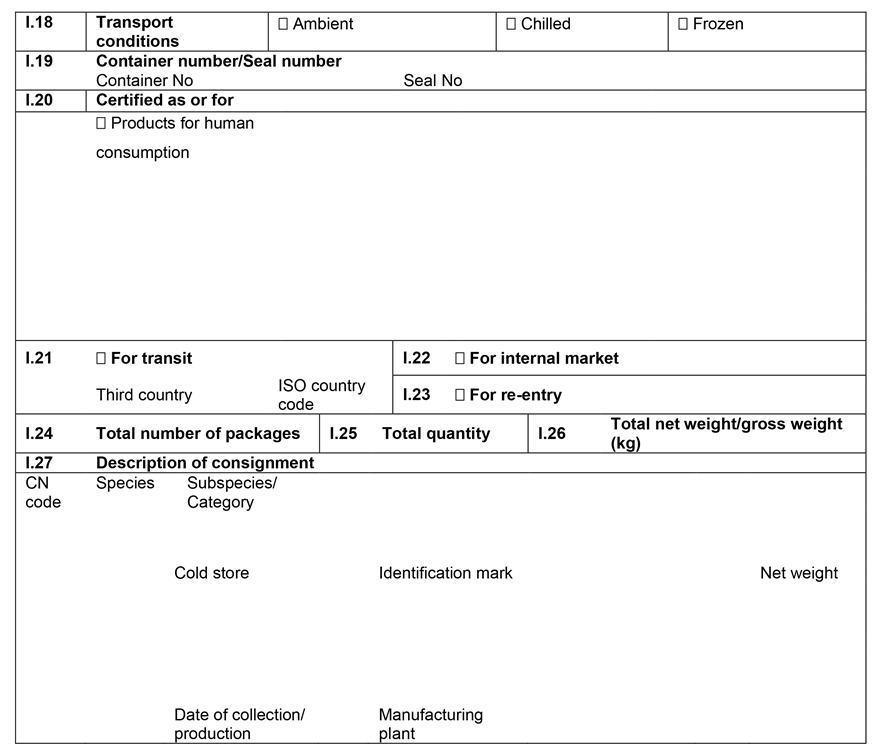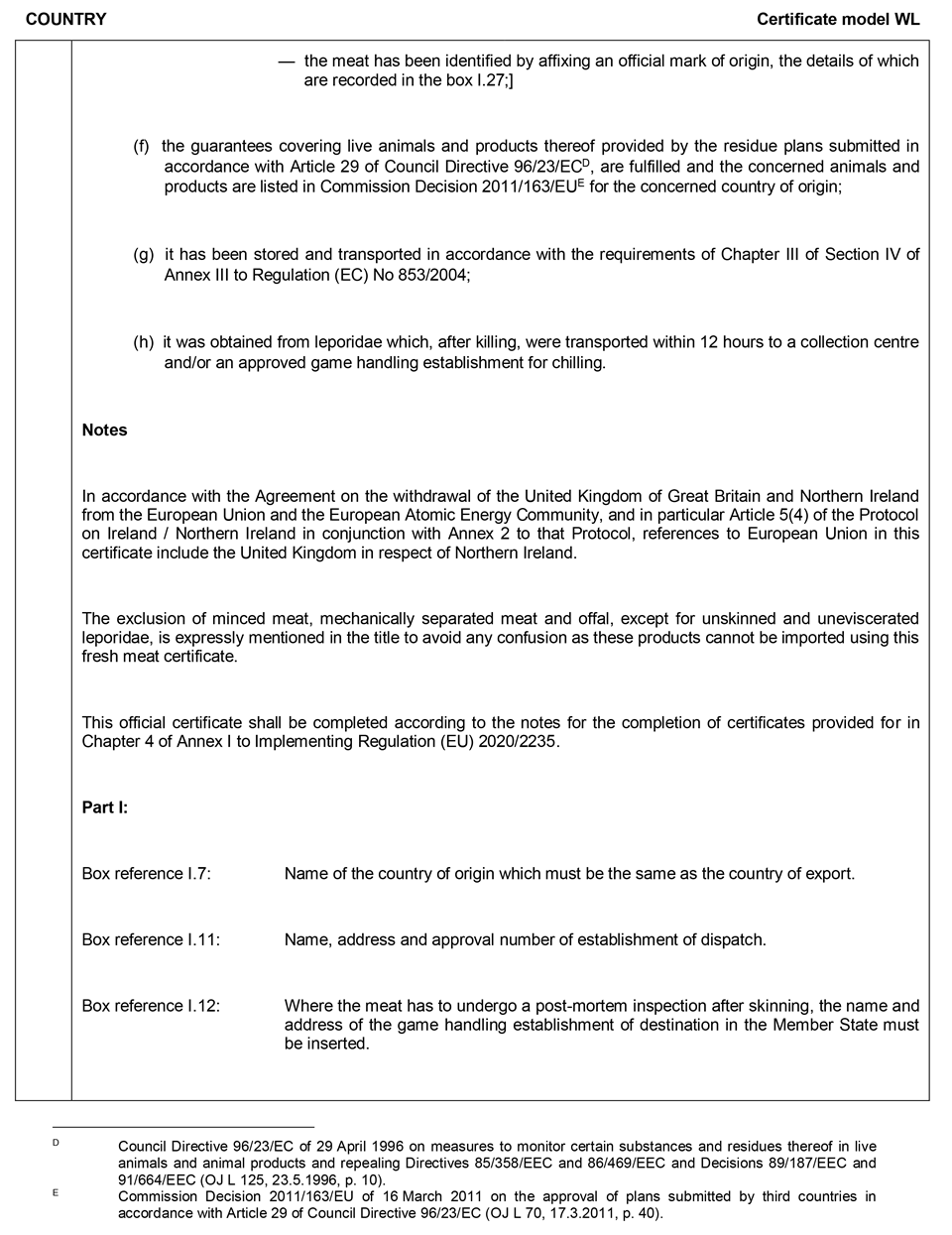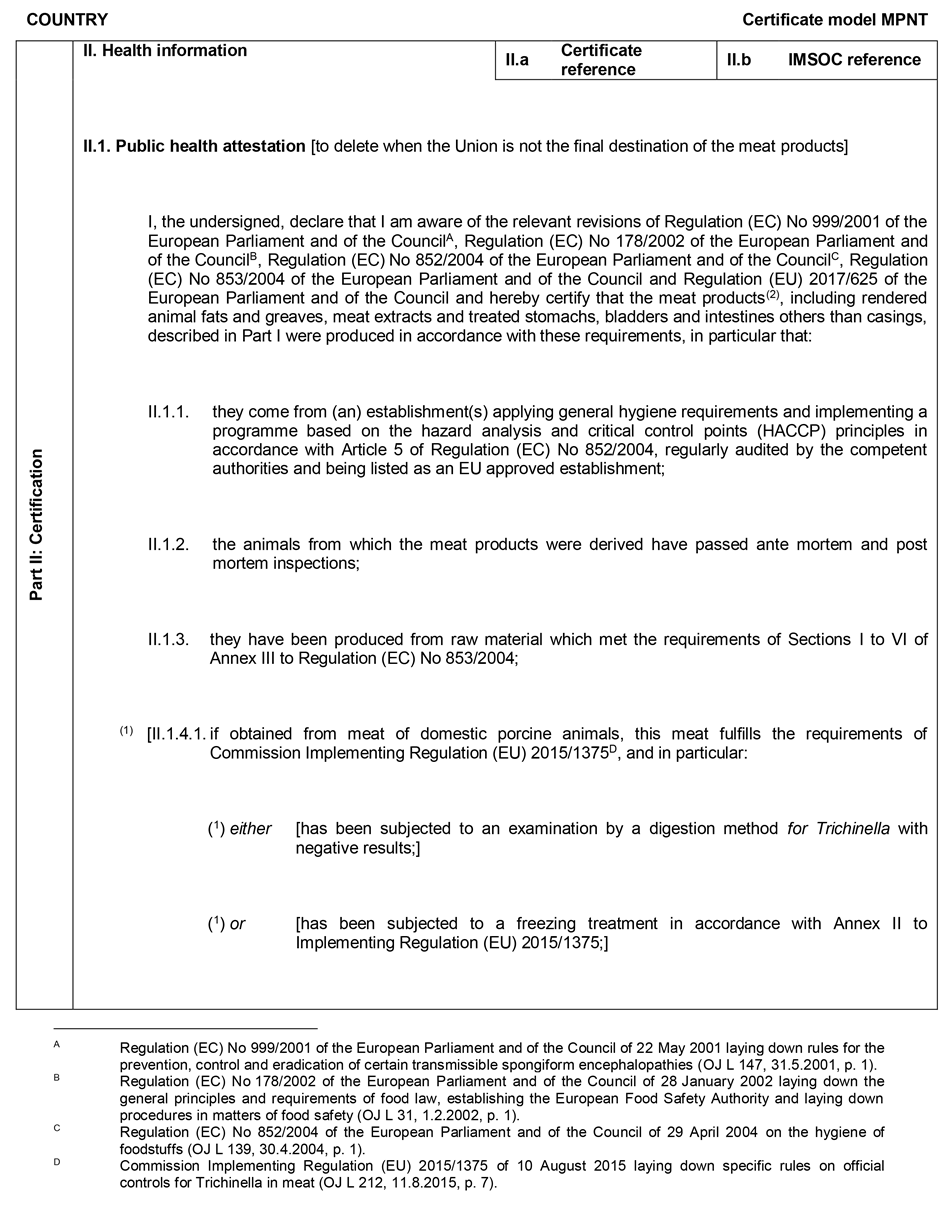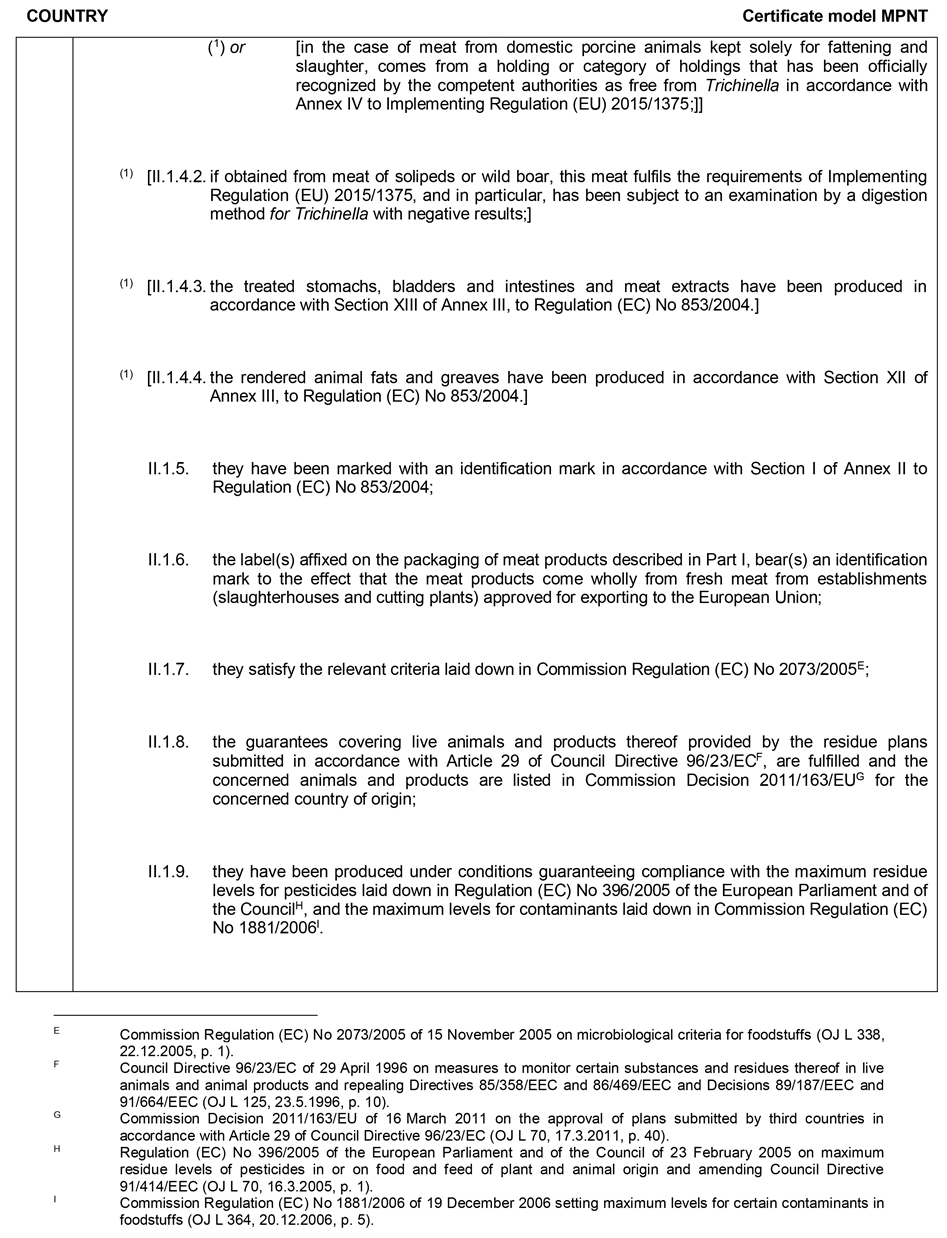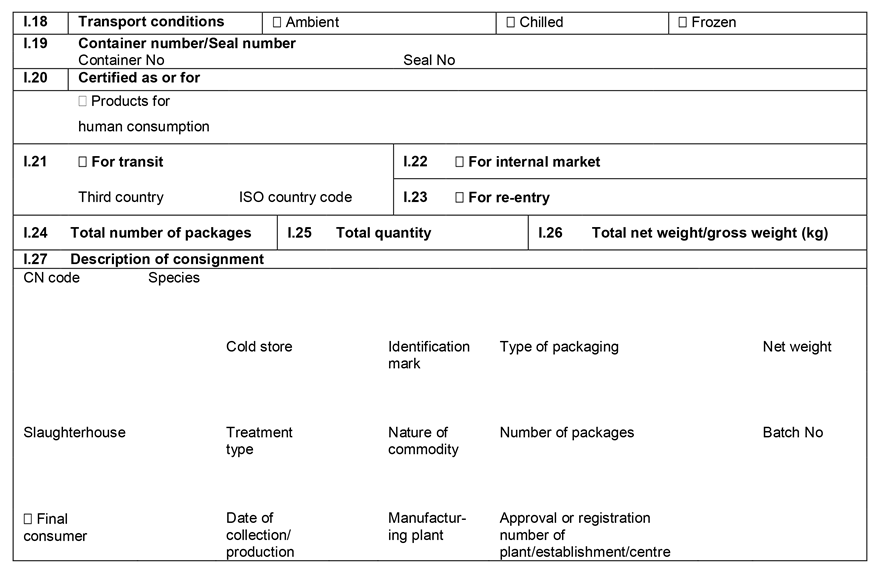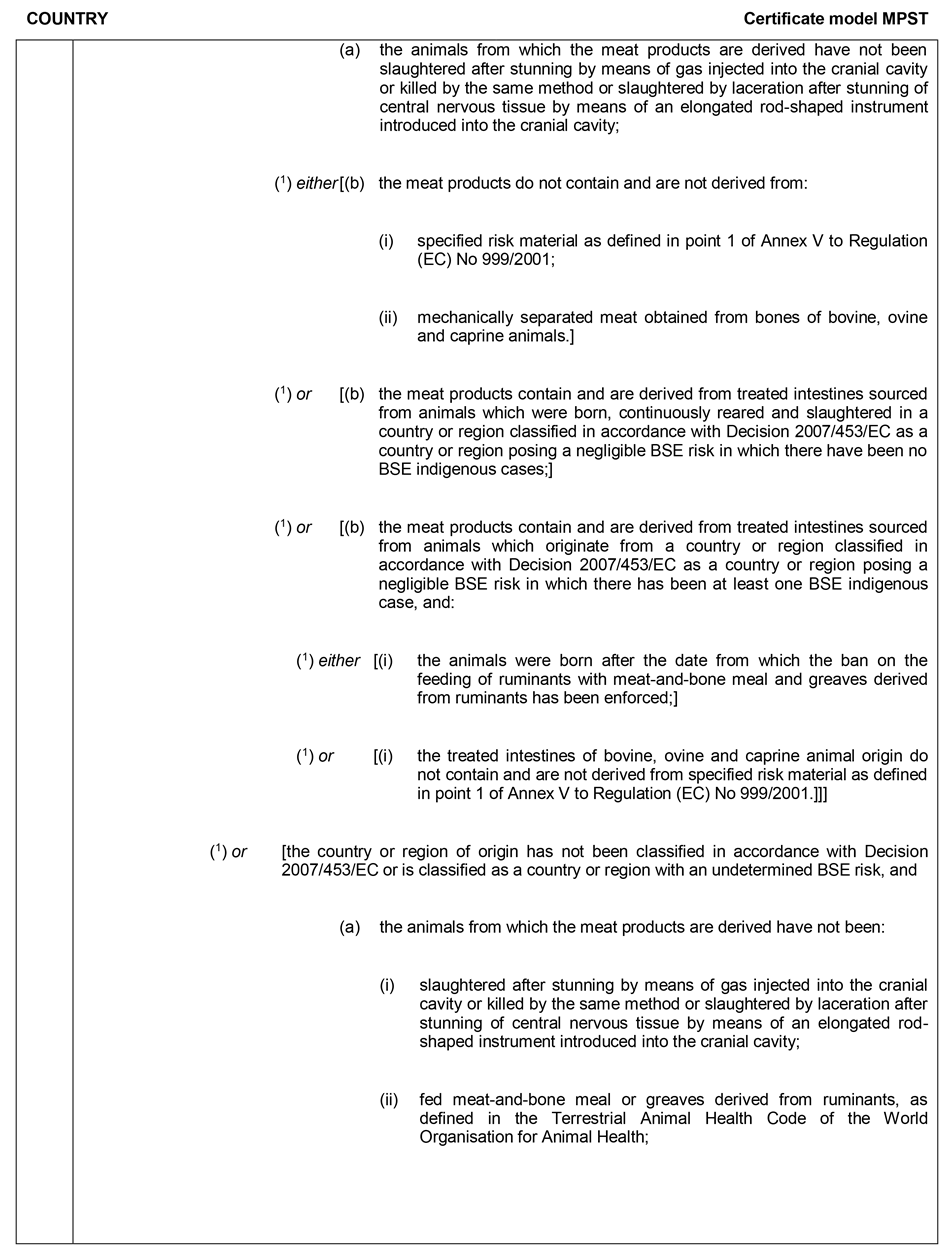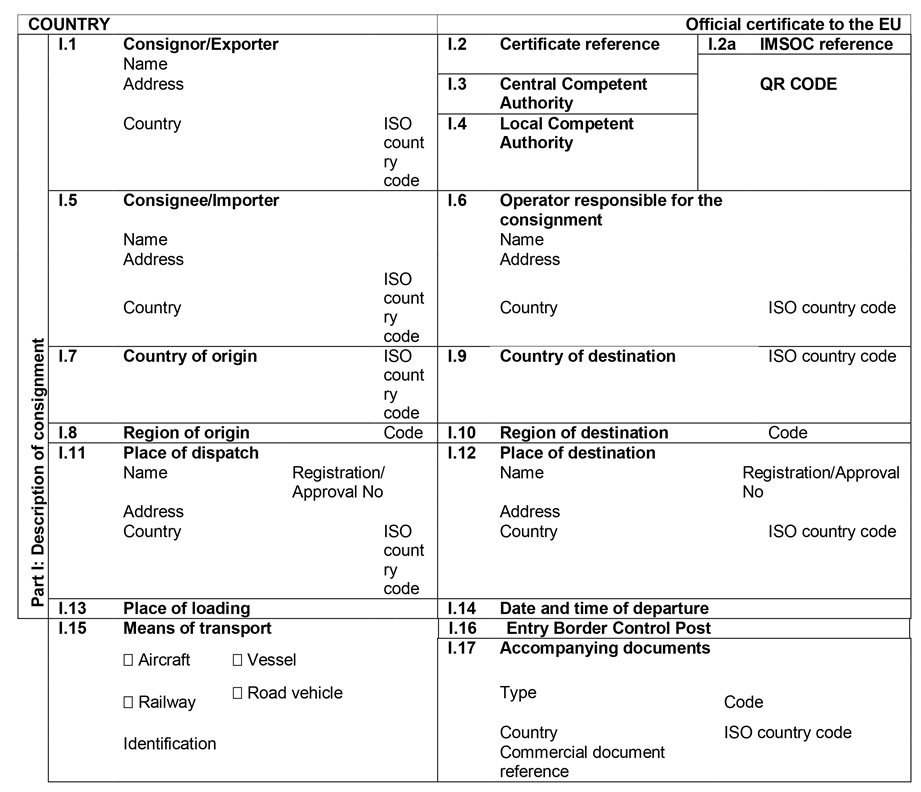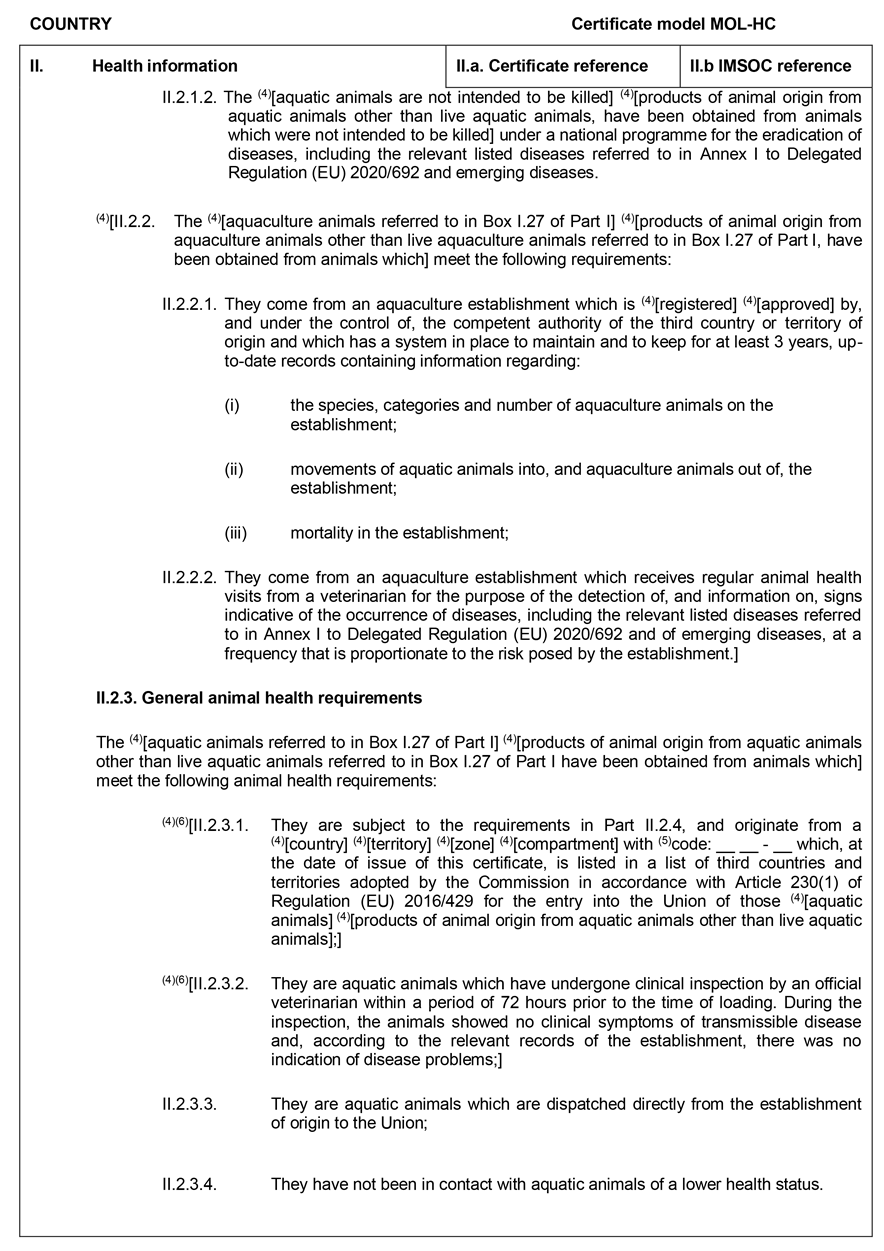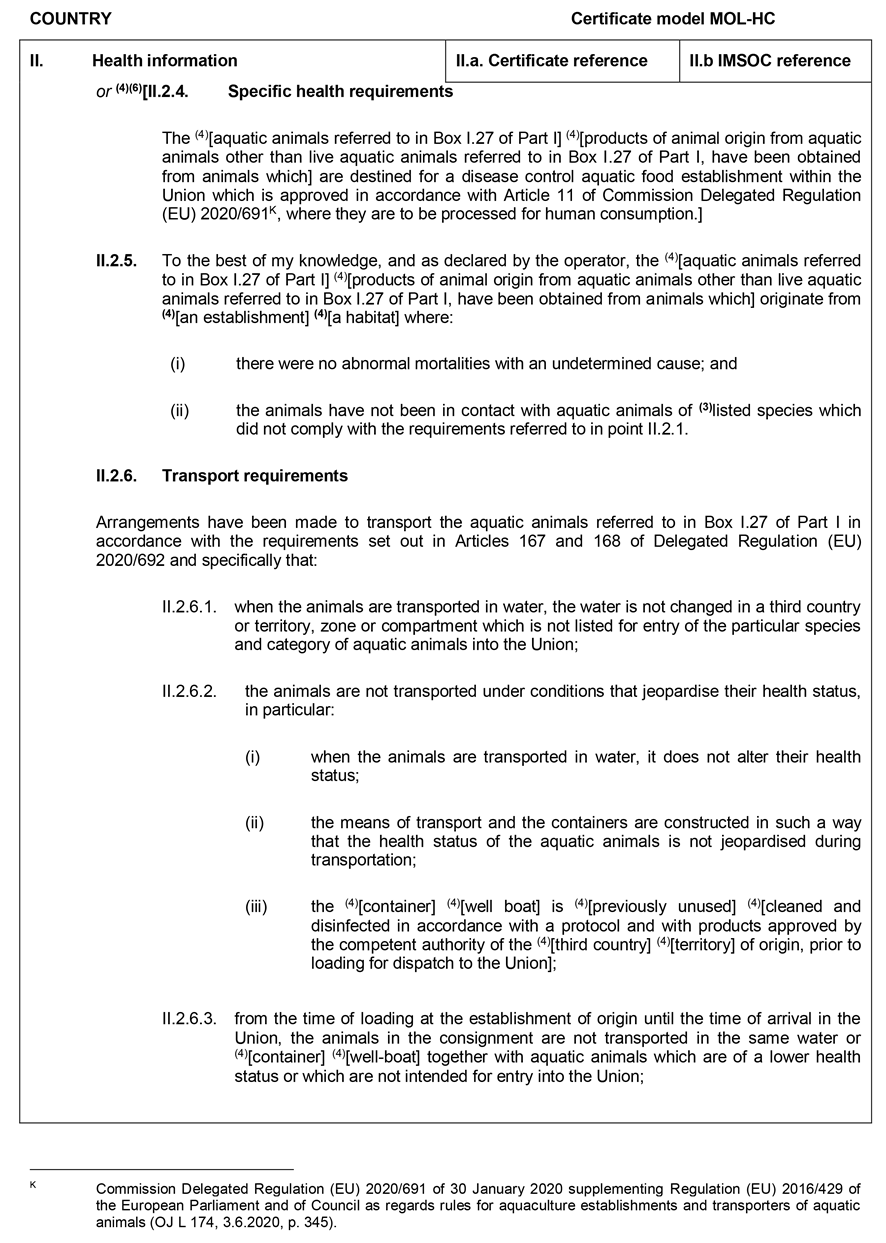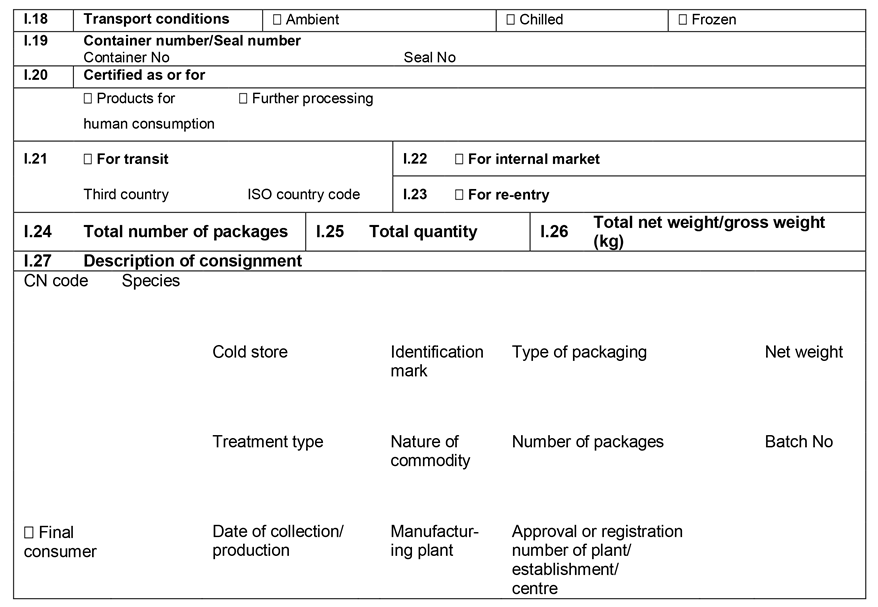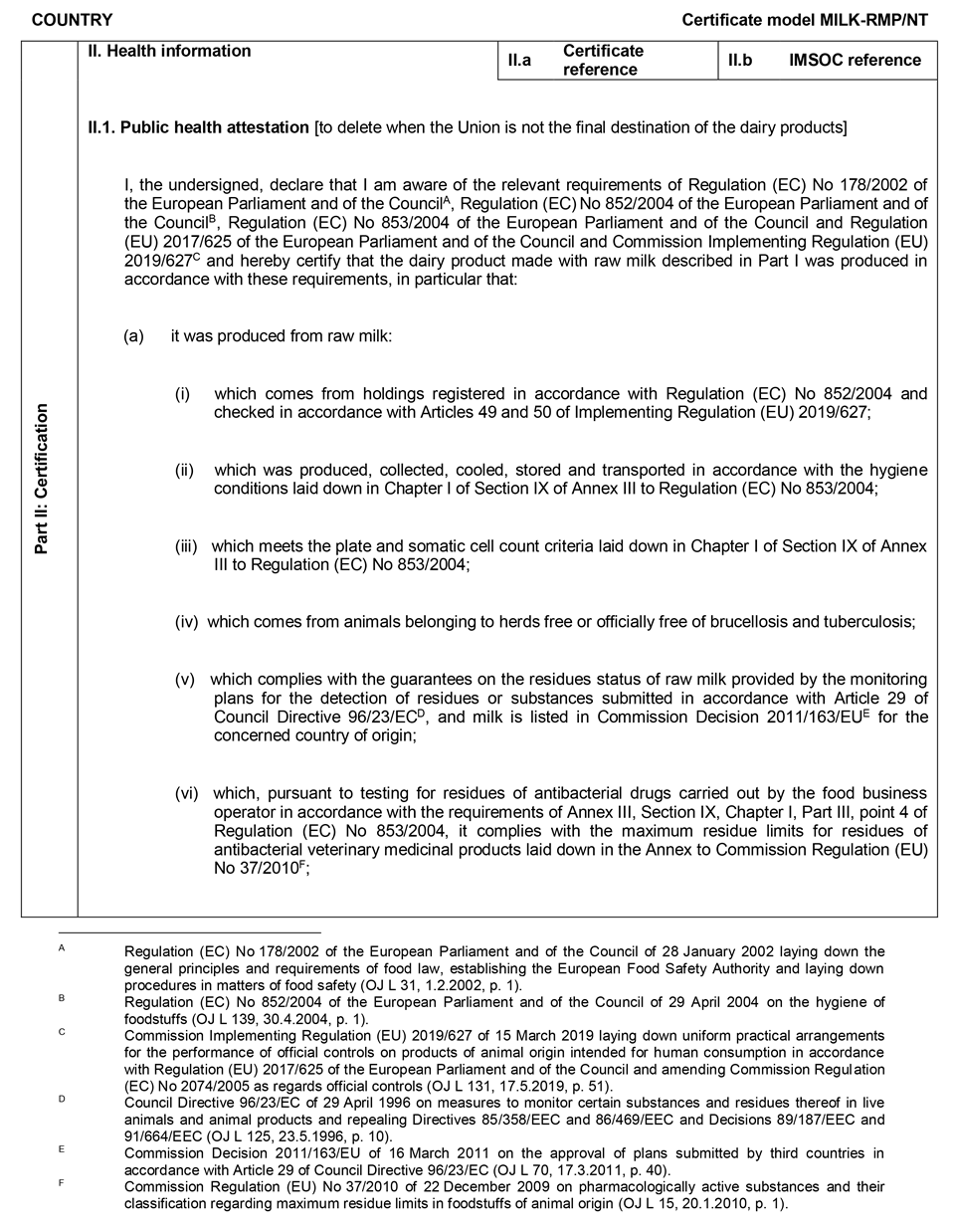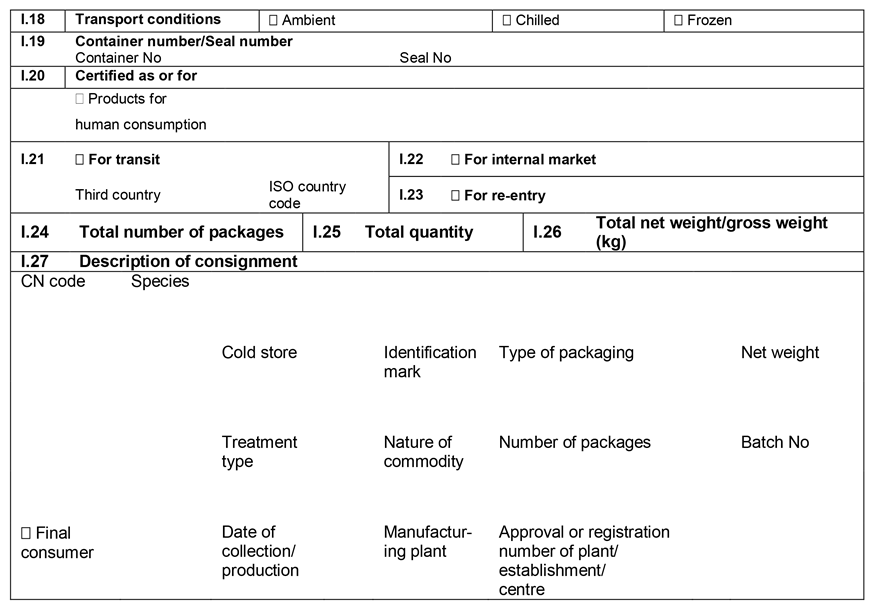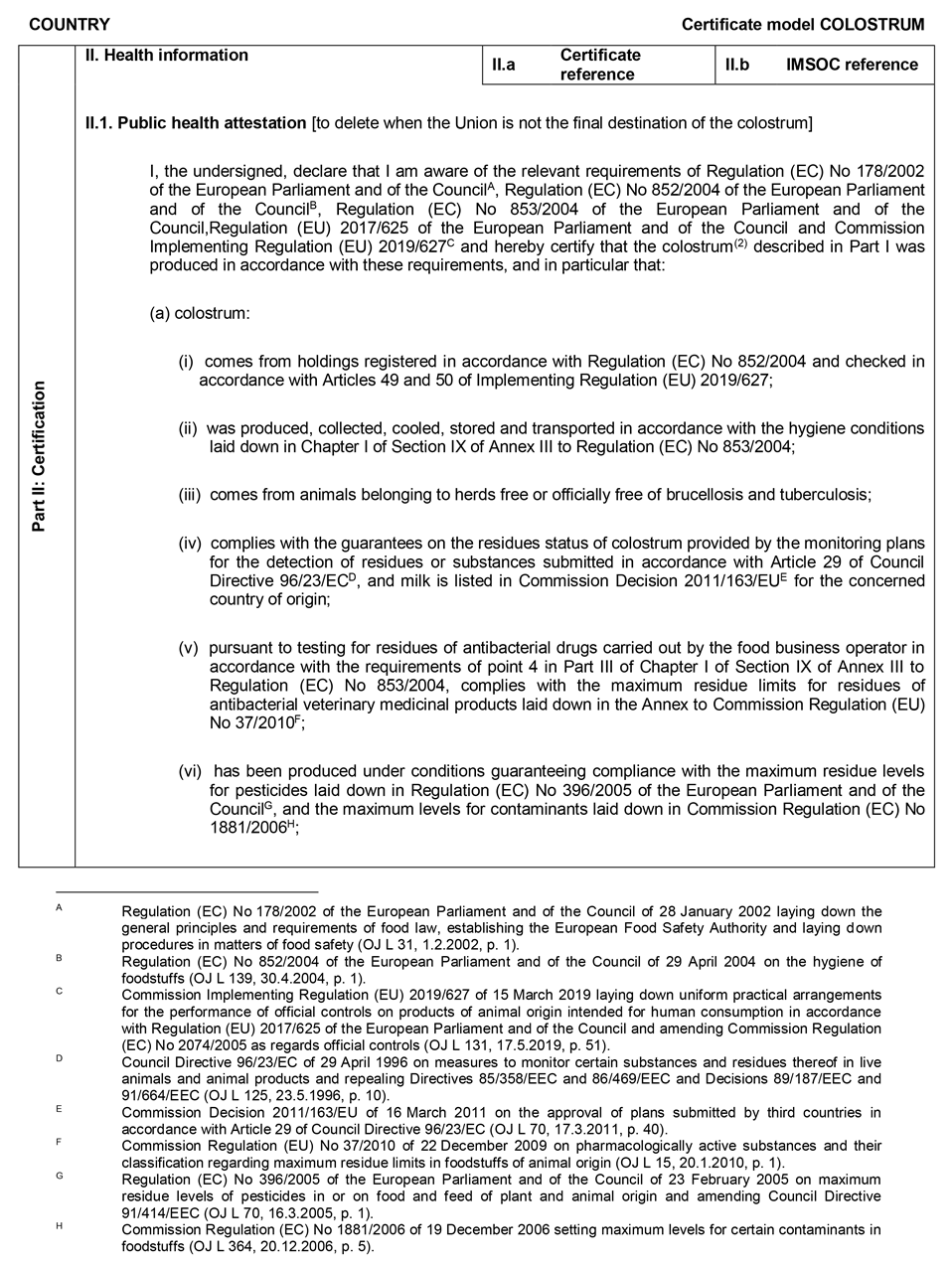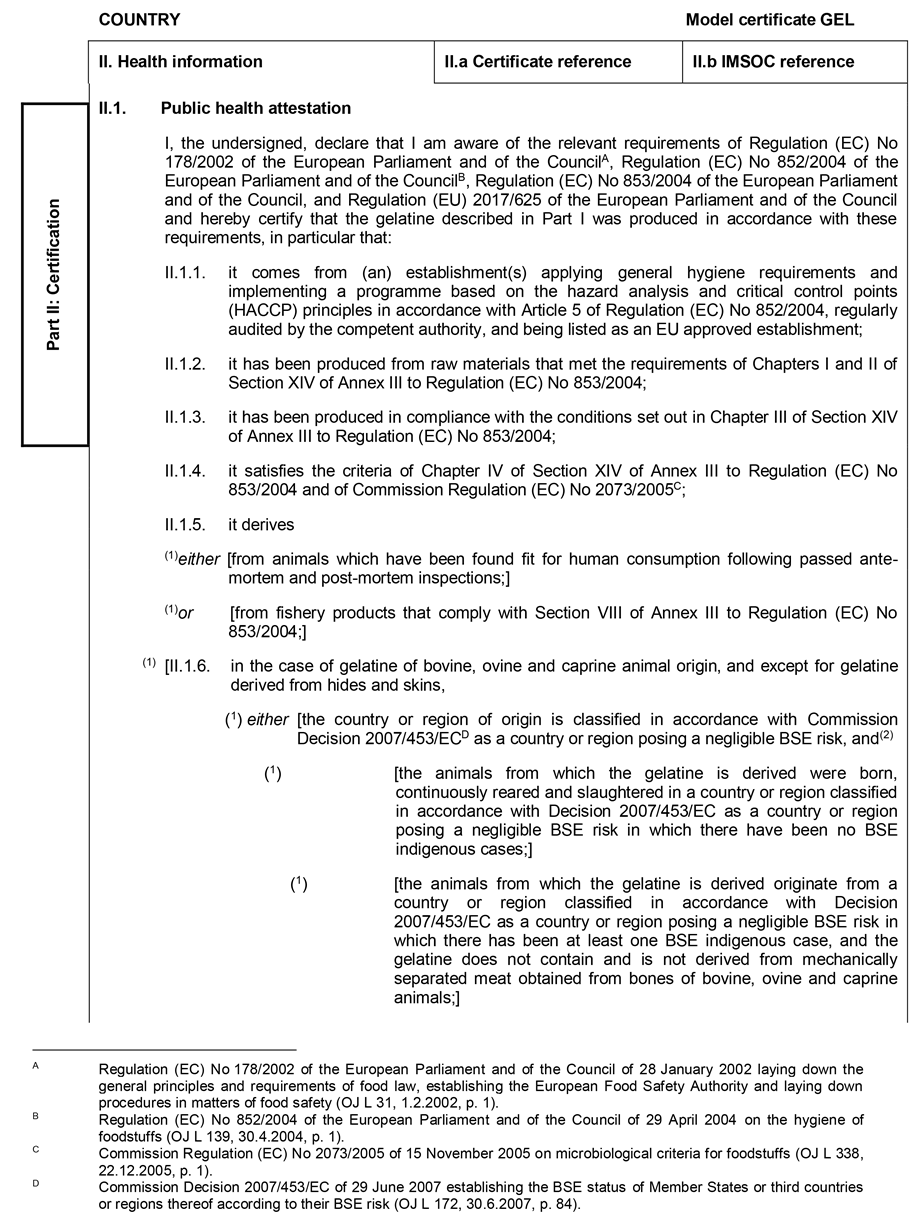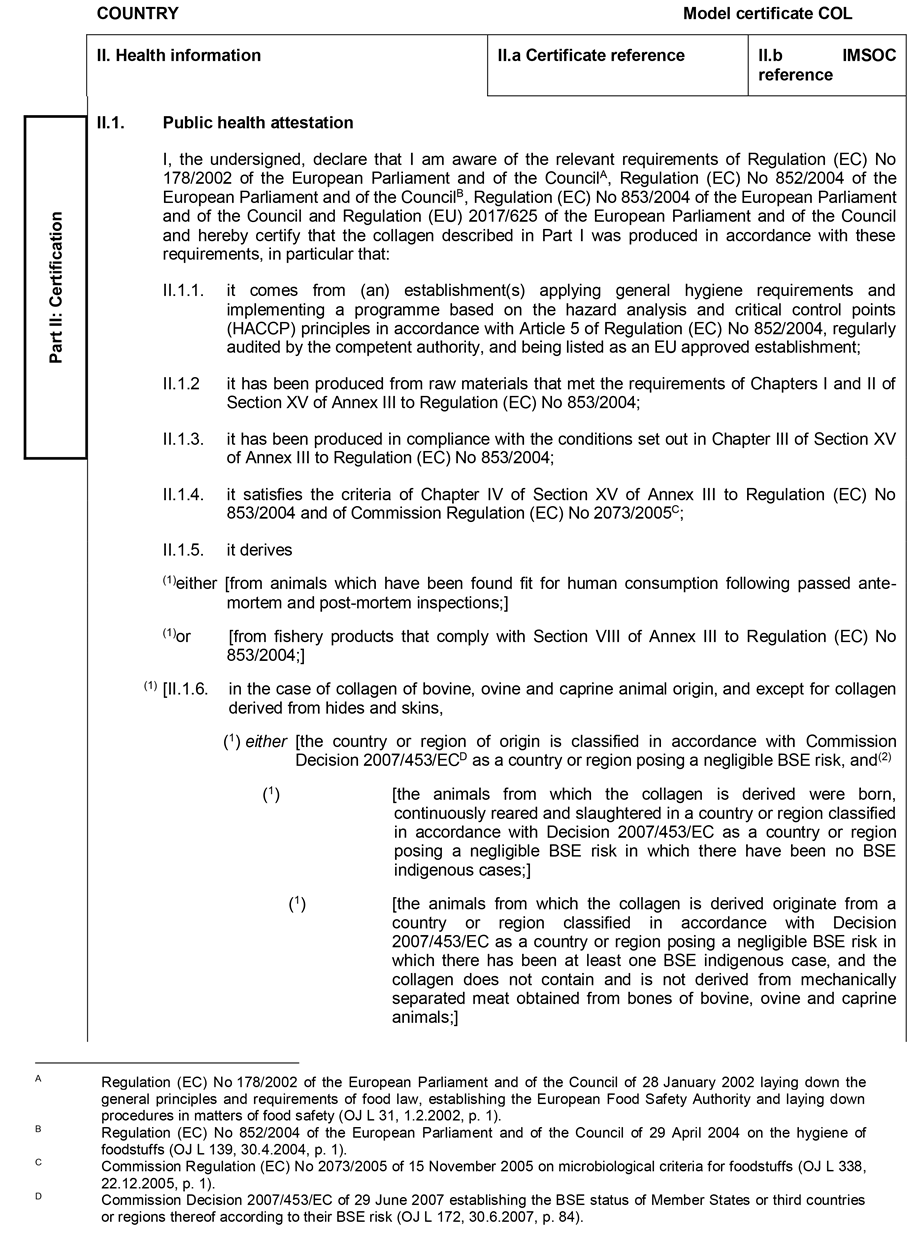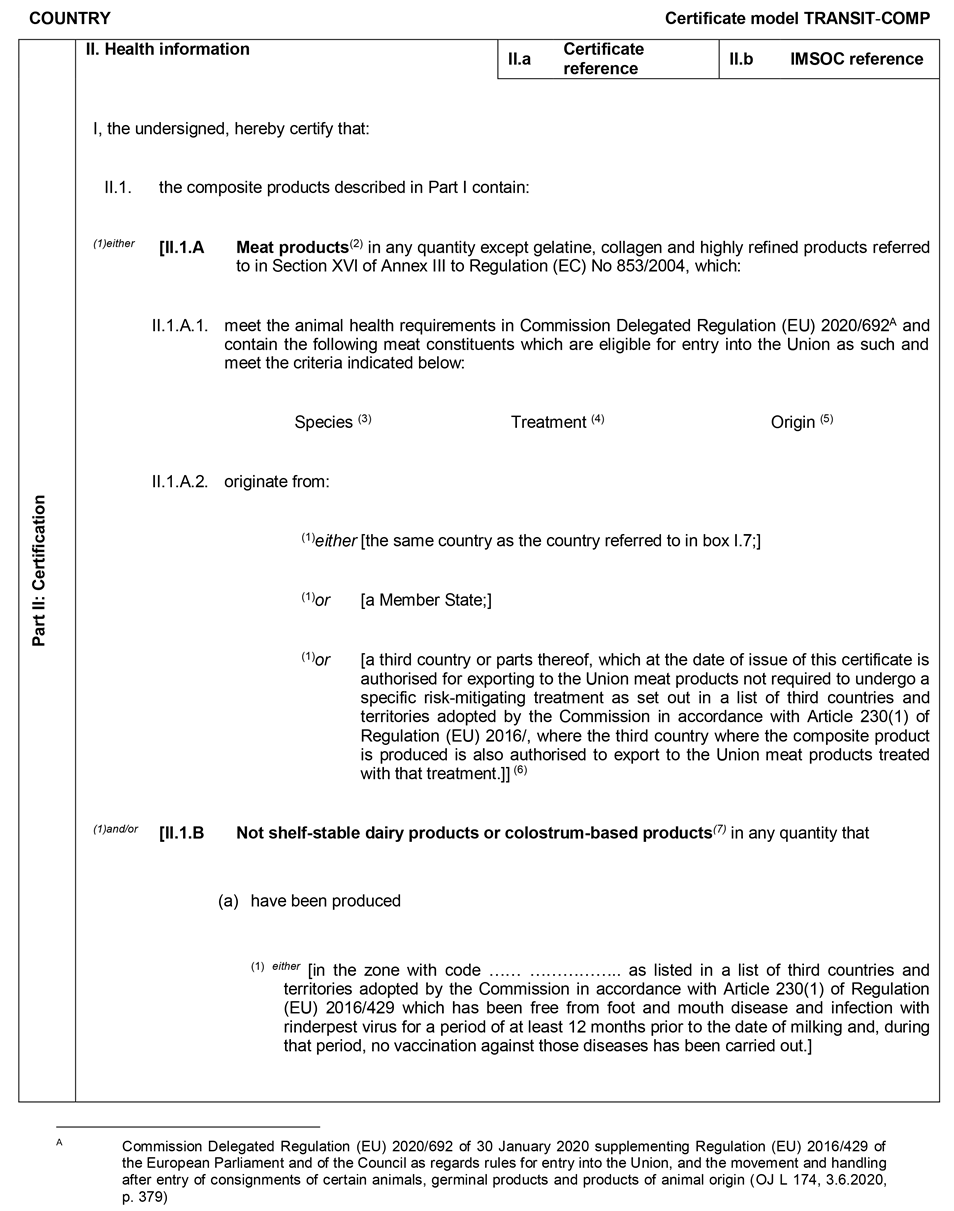Commission Implementing Regulation (EU) 2020/2235
of 16 December 2020
laying down rules for the application of Regulations (EU) 2016/429 and (EU) 2017/625 of the European Parliament and of the Council as regards model animal health certificates, model official certificates and model animal health/official certificates, for the entry into the Union and movements within the Union of consignments of certain categories of animals and goods, official certification regarding such certificates and repealing Regulation (EC) No 599/2004, Implementing Regulations (EU) No 636/2014 and (EU) 2019/628, Directive 98/68/EC and Decisions 2000/572/EC, 2003/779/EC and 2007/240/EC
(Text with EEA relevance)
THE EUROPEAN COMMISSION,
Having regard to the Treaty on the Functioning of the European Union,
Having regard to Regulation (EC) No 853/2004 of the European Parliament and of the Council of 29 April 2004 laying down specific hygiene rules for food of animal origin(), and in particular point (a) of Article 7(2) thereof,
Having regard to Regulation (EU) 2016/429 of the European Parliament and of the Council of 9 March 2016 on transmissible animal diseases and amending and repealing certain acts in the area of animal health (‘Animal Health Law’)(), and in particular Articles 168(4), 224(4), 238(3) and 239(3) thereof,
Having regard to Regulation (EU) 2017/625 of the European Parliament and of the Council of 15 March 2017 on official controls and other official activities performed to ensure the application of food and feed law, rules on animal health and welfare, plant health and plant protection products, amending Regulations (EC) No 999/2001, (EC) No 396/2005, (EC) No 1069/2009, (EC) No 1107/2009, (EU) No 1151/2012, (EU) No 652/2014, (EU) 2016/429 and (EU) 2016/2031 of the European Parliament and of the Council, Council Regulations (EC) No 1/2005 and (EC) No 1099/2009 and Council Directives 98/58/EC, 1999/74/EC, 2007/43/EC, 2008/119/EC and 2008/120/EC and repealing Regulations (EC) No 854/2004 and (EC) No 882/2004 of the European Parliament and of the Council, Council Directives 89/608/EEC, 89/662/EEC, 90/425/EEC, 91/496/EEC, 96/23/EC, 96/93/EC and 97/78/EC and Council Decision 92/438/EEC (Official Controls Regulation)(), and in particular the first paragraph of Article 90 and Article 126(3) thereof,
Whereas:
(1) Regulation (EU) 2016/429 lays down rules on animal diseases that are transmissible to animals or to humans, including requirements for official animal health certification for various movements of animals, germinal products and products of animal origin. Those requirements, inter alia for movements of certain live aquatic animals and products of animal origin for human consumption, are further specified in Commission Delegated Regulation (EU) 2020/692() pursuant to Regulation (EU) 2016/429. It also empowers the Commission to adopt implementing acts laying down rules for model forms of those animal health certificates, as well rules concerning the information to be contained in certain documents and declarations required for the entry into the Union of such consignments. In addition, that Regulation empowers the Commission to lay down special rules concerning model forms of animal health certificates, declarations and other documents for animals, germinal products and products of animal origin. Regulation (EU) 2016/429 also provides that animal health certificates may include other information required under other Union legislation.
(2) Delegated Regulation (EU) 2020/692 lays down supplementing animal health requirements for entry into the Union of consignments of certain animals, including live aquatic animals, germinal products and products of animal origin. In particular, in accordance with that Regulation, such consignments shall be accompanied by the animal health certificate, and if provided in that Regulation, by declaration or other documents. Those Delegated Regulations provide the requirements which animals and goods for human consumption have to comply with when entering the Union.
(3) Article 168(1) and (3) of Regulation (EU) 2016/429 lays down rules as regards information in the animal health certificate required to accompany movements within a Member State or from one Member State to another Member State of consignments of products of animal origin from terrestrial animals, and empowers the Commission to adopt delegated acts supplementing these rules. Therefore, models of animal health certificates for such movements of products of animal origin produced or processed in establishments, food businesses or zones subject to emergency measures or movement restrictions should be set out by this Regulation.
(4) Article 224(4) of Regulation (EU) 2016/429 empowers the Commission to lay down rules on model forms of animal health certificates.
(5) In addition, Article 238(3) of Regulation (EU) 2016/429 empowers the Commission to lay down by means of implementing acts, rules concerning the contents and the format of models of animal health certificates, declarations and other documents for the entry into the Union of animals, germinal products and products of animal origin.
(6) Article 239(3) of Regulation (EU) 2016/429 empowers the Commission to lay down by means of implementing acts, rules concerning the contents and the format of models of animal health certificates, declarations and other documents for the entry into the Union of animals, germinal products and products of animal origin for which the Union is not the final destination.
(7) In order to provide for legal clarity and consistency of the rules on animals and goods for human consumption, models of official certificates containing the animal health requirements for such movements of certain live aquatic animals and products of animal origin should be set out by this Regulation.
(8) Regulation (EU) 2017/625 lays down rules for the performance of official controls and other official activities performed by the competent authorities of the Member States to ensure compliance with the rules referred to in Article 1(2) of that Regulation, among others, rules on food safety at all stages of production, processing and distribution and animal health and welfare requirements and animal by-products. That Regulation provides for certain rules on official certification when the rules referred to in Article 1(2) or Article 126(2)(c) of that Regulation require the issuance of official certificates. In the absence of more specific rules in Regulation (EU) 2016/429, those rules on official certification apply to the certificates set out in this Regulation.
(9) In particular, point (a) of the first paragraph of Article 90 of Regulation (EU) 2017/625 empowers the Commission to lay down by means of implementing acts, rules concerning model official certificates, for the issuance of such certificates.
(10) The rules referred to in Article 1(2) of Regulation (EU) 2017/625 include animal health requirements, but also, inter alia, rules in the area of food safety and animal welfare. In the interests of legal clarity, and in order to minimise administrative burden during the issuance of certificates, this Regulation should include animal health certificates, to be signed by the official veterinarian, official certificates to be signed by the certifying officer and animal health/ official certificates, to be signed by the official veterinarian or certifying officer, with respect to particular commodities.
(11) In addition, this Regulation should have regard to certain definitions laid down in other Union acts, such as definitions laid down in Annex I to Regulation (EC) No 853/2004 and Part IX of Annex II to Regulation (EU) No 1308/2013 of the European Parliament and of the Council(), as well as the definitions laid down in Commission Implementing Regulation (EU) No 208/2013() and Commission Delegated Regulation (EU) 2019/625().
(12) Regulation (EU) 2016/429 aims at reducing the administrative burden in relation to certification and notification by using information technology as far as possible for multiple purposes. In addition, that Regulation lays down certain rules regarding the possibility for electronic animal health certificates to accompany certain consignments instead of animal health certificates issued on paper. Regulation (EU) 2017/625 lays down that consignments of animals and goods are to be accompanied by an official certificate issued either on paper or in electronic form. In addition, Article 90(f) of that Regulation empowers the Commission, by means of implementing acts, to lay down rules for the issuance of electronic certificates and for the use of electronic signatures. Therefore, it is appropriate to establish common requirements as regards issuance of certificates in both forms in addition to the requirements laid down in Articles 150 and 217 of Regulation (EU) 2016/429 and in Chapter VII of Title II of Regulation (EU) 2017/625.
(13) To facilitate official controls at the border control posts of entry into the Union, the requirements for certificates for the entry into the Union should include linguistic requirements.
(14) Regulation (EU) 2017/625 provides that the Information Management System for Official Controls (IMSOC) is to allow for the production, handling and transmission of official certificates, including in electronic form. Commission Implementing Regulation (EU) 2019/1715() provides that the Trade Control and Expert System (TRACES) is the IMSOC component enabling certificates to be produced electronically, thus preventing possible fraudulent or deceptive practices in respect of animal health, official certificates or animal health/official certificates. To this end, this Regulation should lay down standard models for official certificates that are compatible with TRACES.
(15) Point (c) of the first paragraph of Article 90 of Regulation (EU) 2017/625 empowers the Commission to lay down by means of implementing acts rules concerning the procedures to be followed for the issuance of replacement certificates. Therefore, it is appropriate to establish common requirements as regards the replacement of certificates and these common requirements, which should apply to animal health certificates, to be signed by the official veterinarian, official certificates to be signed by the certifying officer and animal health/official certificates, to be signed by the official veterinarian or certifying officer, should be set out in this Regulation.
(16) To avoid misuse and abuse, it is important to lay down rules concerning the cases where a replacement certificate may be issued and the requirements that such certificates need to meet. These cases should be limited to administrative errors and to cases where the initial certificate has been damaged or lost.
(17) Article 237(1)(a) of Regulation (EU) 2016/429 provides that the Member States shall only permit the entry into the Union of consignments of animals, germinal products and products of animal origin if they are accompanied by an animal health certificate, unless a derogation is provided for in Article 237(4)(a) of that Regulation. Article 126(2)(c) of Regulation (EU) 2017/625 establishes the requirement that consignments of certain animals and goods entering the Union are to be accompanied by an official certificate, an official attestation or any other evidence that the consignments comply with the relevant requirements established by the rules referred to in Article 1(2) of that Regulation.
(18) In this regard, Delegated Regulation (EU) 2019/625 provides for a list of goods and animals intended for human consumption, in particular products of animal origin, live insects, sprouts for human consumption and seeds intended for the production of sprouts for human consumption, that need to be accompanied by an official certificate upon the entry into the Union. To facilitate official controls upon the entry into the Union of consignments of products of animal origin, live insects, sprouts for human consumption and seeds intended for the production of sprouts for human consumption, model official certificates should be laid down for such goods and animals intended for human consumption.
(19) Point (e) of the first paragraph of Article 90 of Regulation (EU) 2017/625 empowers the Commission to adopt, by means of implementing acts, rules concerning the format of documents that are to accompany animals and goods after official controls have been performed. In accordance with Article 5(2)(f) of Commission Delegated Regulation (EU) 2019/624(), health certificates are to accompany animals to the slaughterhouse after ante-mortem inspection has been carried out at the holding of provenance. The format of such certificates should therefore be laid down in this Regulation.
(20) In the case of emergency slaughter outside the slaughterhouse of certain categories of animals, it is appropriate for reasons of harmonisation and clarity, to lay down a model certificate in this Regulation for the declaration to be issued by the official veterinarian in accordance with point (6) of Chapter VI of Section I of Annex III to Regulation (EC) No 853/2004.
(21) Commission Implementing Regulation (EU) 2019/628() lays down, inter alia, supplementing rules for the uniform application of Articles 88 and 89 of Regulation (EU) 2017/625 and sets out model official certificates listed therein. However, Regulation (EU) 2016/429 repeals certain legal acts mentioned in that Implementing Regulation. Therefore, for reasons of harmonisation and clarity, in order to avoid duplication of rules, the model certificates laid down in Implementing Regulation (EU) 2019/628 should be replaced by the certificates laid down in this Regulation and Implementing Regulation (EU) 2019/628 should be repealed.
(22) Given that the rules laid down in Commission Regulation (EC) No 599/2004() and Commission Implementing Regulation (EU) No 636/2014() and Commission Decisions 2000/572/EC(), 2003/779/EC() and 2007/240/EC() are now included in this Regulation those legal acts should be repealed.
(23) Regulation (EC) No 882/2004 of the European Parliament and of the Council() repeals Council Directive 95/53/EC(). Commission Directive 98/68/EC() laid down the standard document for the introduction of feedingstuffs from third countries and for checks on such feedingstuffs at the external border. Since in accordance with Regulation (EU) 2017/625, systematic mandatory checks of feedingstuffs at border control posts of entry into the Union are no longer required, the entry document established by Commission Directive 98/68/EC is devoid of purpose.
(24) It is appropriate to introduce a transitional period to take into account the specific situation of competent authorities in third countries that need to make the necessary arrangements to ensure compliance with this Regulation and the specific situation of shipments of consignments of animals and goods accompanied by certificates issued in accordance with Commission Regulation (EU) No 28/2012() and Implementing Regulation (EU) 2019/628 before the date of application of this Regulation.
(25) As Regulation (EU) 2016/429 applies with effect from 21 April 2021, this Regulation should also apply from that date.
(26) The measures provided for in this Regulation are in accordance with the opinion of the Standing Committee on Plants, Animals, Food and Feed,
HAS ADOPTED THIS REGULATION:
Modifications etc. (not altering text)
Article 1U.K.Subject matter and scope
1.This Regulation lays down rules regarding animal health certificates provided for in Regulation (EU) 2016/429, official certificates provided for in Regulation (EU) 2017/625 and animal health/ official certificates based on those Regulations and as regards the issuance and replacement of those certificates required for the entry into the Union(), movements within the Union and between Member States of certain consignments of animals and goods (hereinafter together referred to as ‘the certificates’).
2.This Regulation establishes standard models for animal health certificates, official certificates or animal health/official certificates:
(a)for movements between Member States or within the Union of animals, products of animal origin and germinal products thereof and notes for their completion;
(b)for the entry into the Union of animals, products of animal origin, composite products, germinal products, animal by-products, sprouts for human consumption and seeds intended for the production of sprouts for human consumption, and notes for their completion.
3.This Regulation establishes model certificates, in the form of animal health certificates, official certificates or animal health/official certificates respectively, and a model attestation for the following animals and goods intended for human consumption:
(a)model certificates for movements within the Union of the following goods intended for human consumption:
(i)
products of animal origin from terrestrial animals which are allowed to be moved from a restricted zone subject to emergency measures or disease control measures or which originate from animals of species subject to those measures;
(ii)
unskinned large wild game;
(b)model certificates for the entry into the Union of the following animals and goods intended for human consumption:
(i)
products of animal origin and composite products for which such certificate is required in accordance with Article 13 of Delegated Regulation (EU) 2019/625;
(ii)
certain live aquatic animals and products of animal origin for which such certificate is required in accordance with point (c) of the first paragraph of Article 3 of Delegated Regulation (EU) 2020/692;
(iii)
live insects and live snails;
(c)a model certificate for sprouts and seeds intended for the production of sprouts;
(d)a model certificate for transit through the Union to a third country either by immediate transit or after storage in the Union of composite products intended for human consumption;
(e)model certificates in the case of ante-mortem inspection at the holding of provenance or in the case of emergency slaughter outside the slaughterhouse;
(f)a model private attestation signed by the importing food business operator for shelf-stable composite products containing processed products of animal origin other than processed meat, where such composite products are entering into the Union.
Article 2U.K.Definitions
For the purpose of this Regulation, the following definitions shall apply:
(1)
‘slaughterhouse’ means a slaughterhouse as defined in point 1.16 of Annex I to Regulation (EC) No 853/2004;
(2)
‘frogs' legs’ means frogs’ legs as defined in point 6.1 of Annex I to Regulation (EC) No 853/2004 and frogs’ legs of the genus Pelophylax from the family of Ranidae, and the genera Limnonectes, Fejervarya and Hoplobatrachus from the family of Dicroglossidae;
(3)
‘snails’ means snails as defined in point 6.2 of Annex I to Regulation (EC) No 853/2004 and any other snails of the families of Helicidae, Hygromiidae or Sphincterochilidae;
(4)
‘insects’ means insects as defined in point (17) of Article 2 of Delegated Regulation (EU) 2019/625;
(5)
‘reefer vessel’ means a reefer vessel as defined in point (26) of Article 2 of Delegated Regulation (EU) 2019/625;
(6)
‘freezer vessel’ means a freezer vessel as defined in point 3.3 of Annex I to Regulation (EC) No 853/2004;
(7)
‘factory vessel’ means a factory vessel as defined in point 3.2 of Annex I to Regulation (EC) No 853/2004;
(8)
‘dispatch centre’ means a dispatch centre as defined in point 2.7 of Annex I to Regulation (EC) No 853/2004;
(9)
‘game-handling establishment’ means a game-handling establishment as defined in point 1.18 of Annex I to Regulation (EC) No 853/2004;
(10)
‘cutting plant’ means a cutting plant as defined in point 1.17 of Annex I to Regulation (EC) No 853/2004;
(11)
‘sprouts’ means sprouts as defined in point (a) of the first paragraph of Article 2 of Implementing Regulation (EU) No 208/2013.
Article 3U.K.Standard models for certificates for movements within the Union, between Member States and for entry into the Union
1.Models for certificates for movements of animals and products between Member States or within the Union shall contain entries for the information set out in the standard model in Chapter 1 of Annex I.
2.Models for certificates for the entry into the Union of animals, products of animal origin, composite products, germinal products, animal by-products, sprouts for human consumption and seeds intended for the production of sprouts for human consumption shall contain entries for the information set out in the standard model in Chapter 3 of Annex I.
Article 4U.K.Completion of certificates for animals and goods intended for human consumption
1.Certificates for movements of animals and goods intended for human consumption within the Union or between Member States shall be duly completed and signed by the official veterinarian or certifying officer in accordance with the explanatory notes provided for in Chapter 2 of Annex I.
2.Certificates for the entry into the Union of animals, products of animal origin, composite products, sprouts for human consumption and seeds intended for the production of sprouts for human consumption shall be duly completed and signed by the official veterinarian or certifying officer authorised by the competent authority of a third country to sign relevant certificates in accordance with the explanatory notes provided for in Chapter 4 of Annex I.
3.Operators responsible for consignments referred to in paragraphs 1 and 2 shall provide the competent authority the information on the description of such consignments as described in Part I of the model certificates set out in Annexes II, III and IV of this Regulation.
4.For the purposes of this Regulation, the competent authority shall ensure that the certificates which include an animal health attestation are signed by the official veterinarian.
Article 5U.K.Requirements for certificates for consignments of animals and goods intended for human consumption
1.The official veterinarian or the certifying officer shall complete certificates for consignments of animals and goods intended for human consumption in accordance with the following requirements:
(a)the certificate must bear the signature of the official veterinarian or the certifying officer and the official stamp; the colour of the signature and the colour of stamp, other than embossed or watermarked stamp, must be different to the colour of the printing;
(b)where the certificate contains multiple or alternative statements, the statements which are not relevant must be crossed out, initialled and stamped by the official veterinarian or certifying officer, or completely removed from the certificate;
(c)the certificate must consist of one of the following:
(i)
a single sheet of paper;
(ii)
several sheets of paper where all sheets are indivisible and constitute an integrated whole;
(iii)
a sequence of pages with each page numbered so as to indicate that it is a particular page in a finite sequence;
(d)where the certificate consists of a sequence of pages as referred to in point (c)(iii), of this paragraph, each page must bear the unique code referred to in Article 89(1)(a) of Regulation (EU) 2017/625, the signature of the official veterinarian or certifying officer and the official stamp;
(e)in the case of certificates for movements of consignments within the Union or between Member States, the certificate must accompany the consignment until it reaches the place of destination in the Union;
(f)in the case of certificates for the entry into the Union of consignments, the certificate must be presented to the competent authority of the border control post of entry into the Union where the consignment is subjected to official controls;
(g)the certificate must be issued before the consignment to which it relates leaves the control of the competent authority issuing the certificate;
(h)in the case of certificates for the entry into the Union, the certificate must be drawn up in the official language, or in one of the official languages, of the Member State of the border control post of entry into the Union.
2.By way of derogation from paragraph 1(h) a Member State may consent to certificates being drawn up in another official language of the Union and accompanied, if necessary, by an authenticated translation.
3.Points (a) to (e) of paragraph 1 do not apply to electronic certificates issued in accordance with the requirements of Article 39(1) of Implementing Regulation (EU) 2019/1715.
4.Points (b), (c) and (d) of paragraph 1 shall not apply to certificates issued in paper and completed in, and printed from, TRACES.
Article 6U.K.Replacement of certificates for consignments of animals and goods intended for human consumption
1.Competent authorities shall only issue replacement certificates for consignments of animals and goods intended for human consumption in the case of administrative errors in the initial certificate or where the initial certificate has been damaged or lost.
2.In the replacement certificate, the competent authority shall not modify information in the initial certificate concerning the identification of the consignment, its traceability and the guarantees provided for in the initial certificate for the consignment.
3.In the replacement certificate, the competent authority shall:
(a)make clear reference to the unique code referred to in Article 89(1)(a) of Regulation (EU) 2017/625 and the date of issue of the initial certificate, and clearly state that it replaces the initial certificate;
(b)indicate a new certificate number different to that of the initial certificate;
(c)indicate the date when it was issued, as opposed to the date of issue of the initial certificate;
(d)produce an original document issued in paper, except in the case of electronic replacement certificates submitted in TRACES.
4.In the case of entry into the Union of consignments, the competent authority of the border control post of entry into the Union may refrain from requesting the operator responsible for the consignment to provide a replacement certificate when information concerning the consignee, the importer, the border control post of entry into the Union or the means of transport changes after the certificate has been issued and such new information is provided by the operator responsible for the consignment.
Article 7U.K.Model animal health certificate and official certificate for movements within the Union and between Member States of certain products of animal origin intended for human consumption
1.The animal health certificate referred to in point Article 1(3)(a)(i) to be used for movement within the Union of products of animal origin, which are allowed to be moved from a restricted zone subject to emergency measures or disease control measures or originate from animals of species subject to those measures shall correspond to the model INTRA-EMERGENCY drawn up in accordance with the model set out in Chapter 1 of Annex II.
2.The official certificate referred to in Article 1(3)(a)(ii) to be used for movements between Member States of unskinned large wild game intended for human consumption shall correspond to the model INTRA-UNSKINNED LARGE WILD GAME drawn up in accordance with the model set out in Chapter 2 of Annex II.
Article 8U.K.Model animal health/official certificates for the entry into the Union of fresh meat of ungulates intended for human consumption
The animal health/official certificates referred to in Article 1(3)(b)(ii) to be used for the entry into the Union of fresh meat of ungulates intended for human consumption shall correspond to one of the following models, depending on the species and categories of products concerned:
(a)
BOV drawn up in accordance with the model set out in Chapter 1 of Annex III, for fresh meat intended for human consumption, excluding mechanically separated meat, of domestic bovine animals;
(b)
OVI drawn up in accordance with the model set out in Chapter 2 of Annex III, for fresh meat intended for human consumption, excluding mechanically separated meat, of domestic ovine and caprine animals;
(c)
POR drawn up in accordance with the model set out in Chapter 3 of Annex III, for fresh meat intended for human consumption, excluding mechanically separated meat, of domestic porcine animals;
(d)
EQU drawn up in accordance with the model set out in Chapter 4 of Annex III, for fresh meat intended for human consumption, excluding minced meat and mechanically separated meat, of domestic solipeds (Equus caballus, Equus asinus and their cross-breeds);
(e)
RUF drawn up in accordance with the model set out in Chapter 5 of Annex III, for fresh meat intended for human consumption, excluding offal, minced meat and mechanically separated meat, of animals of the family Bovidae (other than domestic bovine, ovine and caprine animals), camelid animals and cervid animals kept as farmed game;
(f)
RUW drawn up in accordance with the model set out in Chapter 6 of Annex III, for fresh meat intended for human consumption, excluding offal, minced meat and mechanically separated meat, of wild animals of the family Bovidae (other than domestic bovine, ovine and caprine animals), wild camelid animals and wild cervid animals;
(g)
SUF drawn up in accordance with the model set out in Chapter 7 of Annex III, for fresh meat intended for human consumption, excluding offal, minced meat and mechanically separated meat, of animals kept as farmed game of wild breeds of porcine animals and animals of the family Tayassuidae;
(h)
SUW drawn up in accordance with the model set out in Chapter 8 of Annex III, for fresh meat intended for human consumption, excluding offal, minced meat and mechanically separated meat, of wild animals of wild breeds of porcine animals and animals of the family Tayassuidae;
(i)
EQW drawn up in accordance with the model set out in Chapter 9 of Annex III, for fresh meat intended for human consumption, excluding offal, minced meat and mechanically separated meat, of wild game solipeds belonging to the subgenus Hippotigris (zebra);
(j)
RUM-MSM drawn up in accordance with the model set out in Chapter 10 of Annex III, for mechanically separated meat, intended for human consumption, of domestic ruminants;
(k)
SUI-MSM drawn up in accordance with the model set out in Chapter 11 of Annex III, for mechanically separated meat, intended for human consumption, of domestic porcine animals;
(l)
NZ-TRANSIT-SG drawn up in accordance with the model set out in Chapter 12 of Annex III, for fresh meat intended for human consumption originating from New Zealand transiting through Singapore with unloading, possible storage and reloading before entry into the Union.
Article 9U.K.Model animal health/official certificates for the entry into the Union of meat of poultry, ratites and other game birds, eggs and egg products intended for human consumption
The animal health/official certificates referred to in Article 1(3)(b)(ii) to be used for the entry into the Union of meat of poultry, ratites and other game birds, eggs and egg products intended for human consumption shall correspond to one of the following models, depending on the species and categories of products concerned:
(a)
POU drawn up in accordance with the model set out in Chapter 13 of Annex III, for fresh meat intended for human consumption, excluding minced meat and mechanically separated meat, of poultry other than ratites;
(b)
POU-MI/MSM drawn up in accordance with the model set out in Chapter 14 of Annex III, for minced meat and mechanically separated meat, intended for human consumption, of poultry other than ratites;
(c)
RAT drawn up in accordance with the model set out in Chapter 15 of Annex III, for fresh meat intended for human consumption, excluding minced meat and mechanically separated meat, of ratites;
(d)
RAT-MI/MSM drawn up in accordance with the model set out in Chapter 16 of Annex III, for minced meat and mechanically separated meat, intended for human consumption, of ratites;
(e)
GBM drawn up in accordance with the model set out in Chapter 17 of Annex III, for fresh meat intended for human consumption, excluding minced meat and mechanically separated meat, of game birds;
(f)
GBM-MI/MSM drawn up in accordance with the model set out in Chapter 18 of Annex III, for minced meat and mechanically separated meat, intended for human consumption, of game birds;
(g)
E drawn up in accordance with the model set out in Chapter 19 of Annex III, for eggs intended for human consumption;
(h)
EP drawn up in accordance with the model set out in Chapter 20 of Annex III, for egg products intended for human consumption.
Article 10U.K.Model official certificates and animal health/official certificate for the entry into the Union of fresh meat intended for human consumption, excluding mechanically separated meat, of wild leporidae, of certain wild land mammals and of farmed rabbits
The official certificates and animal health/official certificate referred to in Article 1(3)(b)(ii) to be used for the entry into the Union of fresh meat intended for human consumption, excluding mechanically separated meat, of wild leporidae, of certain wild land mammals and of farmed rabbits shall correspond to one of the following models, depending on the species and categories of products concerned:
(a)
WL drawn up in accordance with the model set out in Chapter 21 of Annex III, for fresh meat intended for human consumption of wild leporidae (rabbits and hares), excluding minced meat, mechanically separated meat and offal except for unskinned and uneviscerated leporidae;
(b)
WM drawn up in accordance with the model set out in Chapter 22 of Annex III, for fresh meat intended for human consumption, excluding offal, minced meat and mechanically separated meat, of wild land mammals other than ungulates and leporidae;
(c)
RM drawn up in accordance with the model set out in Chapter 23 of Annex III, for fresh meat intended for human consumption, excluding minced meat and mechanically separated meat, of farmed rabbits.
Article 11U.K.Model animal health/official certificate for the entry into the Union of meat preparations intended for human consumption
The animal health/official certificate referred to in Article 1(3)(b)(ii) to be used for the entry into the Union of meat preparations intended for human consumption shall correspond to the model MP-PREP drawn up in accordance with the model set out in Chapter 24 of Annex III.
Article 12U.K.Model animal health/official certificates for the entry into the Union of meat products intended for human consumption, including rendered animal fats and greaves, meat extracts and treated stomachs, bladders and intestines others than casings
The animal health/official certificates referred to in Article 1(3)(b)(ii) to be used for the entry into the Union of meat products intended for human consumption, including rendered animal fats and greaves, meat extracts and treated stomachs, bladders and intestines others than casings, shall correspond to one of the following models, depending on the species and categories of products concerned:
(a)
MPNT drawn up in accordance with the model set out in Chapter 25 of Annex III, for meat products intended for human consumption, including rendered animal fats and greaves, meat extracts and treated stomachs, bladders and intestines, others than casings, that are not required to undergo a specific risk-mitigating treatment;
(b)
MPST drawn up in accordance with the model set out in Chapter 26 of Annex III, for meat products intended for human consumption, including rendered animal fats and greaves, meat extracts and treated stomachs, bladders and intestines, others than casings, that are required to undergo a specific risk-mitigating treatment.
Article 13U.K.Model animal health/official certificate for the entry into the Union of casings intended for human consumption
The animal health/official certificate referred to in Article 1(3)(b)(ii) to be used for the entry into the Union of casings intended for human consumption shall correspond to the model CAS drawn up in accordance with the model set out in Chapter 27 of Annex III.
Article 14U.K.Model animal health/official certificate and official certificates for the entry into the Union of live fish, live crustaceans, products of animal origin from those animals and certain fishery products intended for human consumption
1.The animal health/official certificate referred to in Article 1(3)(b)(ii) to be used for the entry into the Union of live fish, live crustaceans and products of animal origin from those animals intended for human consumption shall correspond to the model FISH-CRUST-HC drawn up in accordance with the model set out in Chapter 28 of Annex III.
2.The official certificate referred to in Article 1(3)(b)(ii) to be used in the case of fishery products intended for human consumption caught by vessels flying the flag of a Member State and transferred in third countries with or without storage shall correspond to the model EU-FISH drawn up in accordance with the model set out in Chapter 29 of Annex III.
3.The official certificate referred to in Article 1(3)(b)(ii) to be signed by the captain and to be used for entry into the Union of fishery products or fishery products derived from bivalve molluscs intended for human consumption, entering the Union directly from a reefer, freezer or factory vessel flying the flag of a third country as provided for in Article 11(3) of Delegated Regulation (EU) 2019/625 shall correspond to the model FISH/MOL-CAP drawn up in accordance with the model set out in Chapter 30 of Annex III.
Article 15U.K.Model animal health/official certificate and official certificate for the entry into the Union of live bivalve molluscs, echinoderms, tunicates, marine gastropods, products of animal origin from those animals and certain processed bivalve molluscs intended for human consumption
1.The animal health/official certificate referred to in Article 1(3)(b)(ii) to be used for the entry into the Union of live bivalve molluscs, echinoderms, tunicates, marine gastropods and products of animal origin from those animals intended for human consumption shall correspond to the model MOL-HC drawn up in accordance with the model set out in Chapter 31 of Annex III.
2.The official certificate referred to in Article 1(3)(b)(ii) to be used for the entry into the Union of processed bivalve molluscs intended for human consumption belonging to the species Acanthocardia tuberculatum shall correspond to the model MOL-AT drawn up in accordance with the model set out in Chapter 32 of Annex III.
Article 16U.K.Model animal health/official certificates for the entry into the Union of raw milk, dairy products, colostrum and colostrum-based products intended for human consumption
The animal health/official certificates referred to in Article 1(3)(b)(ii) to be used for the entry into the Union of raw milk, dairy products, colostrum and colostrum-based products intended for human consumption shall correspond to one of the following models, depending on the species and categories of products concerned:
(a)
MILK-RM drawn up in accordance with the model set out in Chapter 33 of Annex III, for raw milk intended for human consumption;
(b)
MILK-RMP/NT drawn up in accordance with the model set out in Chapter 34 of Annex III, for dairy products intended for human consumption derived from raw milk or that are not required to undergo a specific risk-mitigating treatment;
(c)
DAIRY-PRODUCTS-PT drawn up in accordance with the model set out in Chapter 35 of Annex III, for dairy products intended for human consumption that are required to undergo a pasteurization treatment;
(d)
DAIRY-PRODUCTS-ST drawn up in accordance with the model set out in Chapter 36 of Annex III, for dairy products intended for human consumption that are required to undergo a specific risk-mitigating treatment other than pasteurization;
(e)
COLOSTRUM drawn up in accordance with the model set out in Chapter 37 of Annex III, for colostrum intended for human consumption;
(f)
COLOSTRUM-BP drawn up in accordance with the model set out in Chapter 38 of Annex III, for colostrum-based products intended for human consumption.
Article 17U.K.Model official certificate for the entry into the Union of chilled, frozen or prepared frogs’ legs intended for human consumption
The official certificate referred to of Article 1(3)(b)(i) to be used for the entry into the Union of chilled, frozen or prepared frogs’ legs intended for human consumption shall correspond to the model FRG drawn up in accordance with the model set out in Chapter 39 of Annex III.
Article 18U.K.Model official certificate for the entry into the Union of snails intended for human consumption
The official certificate referred to in Article 1(3)(b)(iii) to be used for the entry into the Union of snails intended for human consumption shall correspond to the model SNS drawn up in accordance with the model set out in Chapter 40 of Annex III.
Article 19U.K.Model official certificate for the entry into the Union of gelatine intended for human consumption
The official certificate referred to in Article 1(3)(b)(i) to be used for the entry into the Union of gelatine intended for human consumption shall correspond to the model GEL drawn up in accordance with the model set out in Chapter 41 of Annex III.
Article 20U.K.Model official certificate for the entry into the Union of collagen intended for human consumption
The official certificate referred to in Article 1(3)(b)(i) to be used for the entry into the Union of collagen intended for human consumption shall correspond to the model COL drawn up in accordance with the model set out in Chapter 42 of Annex III.
Article 21U.K.Model animal health/official certificate for the entry into the Union of raw materials for the production of gelatine and collagen intended for human consumption
The animal health/official certificate referred to in Article 1(3)(b)(i) to be used for the entry into the Union of raw materials for the production of gelatine and collagen intended for human consumption shall correspond to the model RCG drawn up in accordance with the model set out in Chapter 43 of Annex III.
Article 22U.K.Model animal health/official certificate for the entry into the Union of treated raw materials for the production of gelatine and collagen intended for human consumption
The animal health/official certificate referred to in Article 1(3)(b)(i) to be used for the entry into the Union of treated raw materials for the production of gelatine and collagen intended for human consumption shall correspond to the model TCG drawn up in accordance with the model set out in Chapter 44 of Annex III.
Article 23U.K.Model official certificate for the entry into the Union of honey and other apiculture products intended for human consumption
The official certificate referred to in of Article 1(3)(b)(i) to be used for the entry into the Union of honey and other apiculture products intended for human consumption shall correspond to the model HON drawn up in accordance with the model set out in Chapter 45 of Annex III.
Article 24U.K.Model official certificate for the entry into the Union of highly refined chondroitin sulphate, hyaluronic acid, other hydrolysed cartilage products, chitosan, glucosamine, rennet, isinglass and amino acids intended for human consumption
The official certificate referred to in Article 1(3)(b)(i) to be used for the entry into the Union of highly refined chondroitin sulphate, hyaluronic acid, other hydrolysed cartilage products, chitosan, glucosamine, rennet, isinglass and amino acids intended for human consumption shall correspond to the model HRP drawn up in accordance with the model set out in Chapter 46 of Annex III.
Article 25U.K.Model official certificate for the entry into the Union of reptile meat intended for human consumption
The official certificate referred to in Article 1(3)(b)(i) to be used for the entry into the Union of reptile meat intended for human consumption shall correspond to the model REP drawn up in accordance with the model set out in Chapter 47 of Annex III.
Article 26U.K.Model official certificate for the entry into the Union of insects intended for human consumption
The official certificate referred to in Article 1(3)(b)(iii) to be used for the entry into the Union of insects intended for human consumption shall correspond to the model INS drawn up in accordance with the model set out in Chapter 48 of Annex III.
Article 27U.K.Model certificate for the entry into the Union of other products of animal origin derived from domestic ungulates, poultry, rabbits or fishery products intended for human consumption and not covered by Articles 8 to 26
The official certificate referred to in Article 1(3)(b)(i) to be used for the entry into the Union of other products of animal origin derived from domestic ungulates, poultry, rabbits or fishery products, intended for human consumption and not covered by Articles 8 to 26 shall correspond to the model PAO drawn up in accordance with the model set out in Chapter 49 of Annex III.
Article 28U.K.Model animal health/official certificate for the entry into the Union of composite products intended for human consumption
The animal health/official certificate referred to in Article 1(3)(b)(i) to be used for the entry into the Union of not shelf-stable composite products and shelf-stable composite products, containing any quantity of meat products except gelatine, collagen and highly refined products, and intended for human consumption shall correspond to the model COMP drawn up in accordance with the model set out in Chapter 50 of Annex III.
Article 29U.K.Model official certificate for the entry into the Union of sprouts intended for human consumption and seeds intended for the production of sprouts for human consumption
The official certificate referred to in Article 1(3)(c) to be used for the entry into the Union of sprouts intended for human consumption and seeds intended for the production of sprouts for human consumption shall correspond to the model SPR drawn up in accordance with the model set out in Chapter 51 of Annex III.
Article 30U.K.Model animal health certificate for transit through the Union to a third country either by immediate transit or after storage in the Union of composite products intended for human consumption
The animal health certificate referred to in Article 1(3)(d) to be used for transit through the Union to a third country either by immediate transit or after storage in the Union of not shelf-stable composite products and shelf-stable composite products, containing any quantity of meat products and intended for human consumption, shall correspond to the model TRANSIT-COMP drawn up in accordance with the model set out in Chapter 52 of Annex III.
Article 31U.K.Model animal health certificates in the case of ante-mortem inspection at the holding of provenance
The animal health certificates referred to in Article 1(3)(e) to be used in the case of ante-mortem inspection at the holding of provenance in accordance with Articles 5 and 6 of Delegated Regulation (EU) 2019/624 shall correspond to one of the following models, depending on the species and categories of products concerned:
(a)
the model set out in Chapter 1 of Annex IV, for live animals transported to the slaughterhouse;
(b)
the model set out in Chapter 2 of Annex IV, for poultry intended for the production of ‘foie gras’ and for delayed eviscerated poultry;
(c)
the model set out in Chapter 3 of Annex IV, for farmed game and domestic bovine, porcine and equine animals, slaughtered at the holding of provenance in accordance with point 3 of Section III of Annex III to Regulation (EC) No 853/2004 and Article 6(3) of Delegated Regulation (EU) 2019/624;
(d)
the model set out in Chapter 4 of Annex IV, for farmed game slaughtered at the holding of provenance in accordance with point 3(a) of Section III of Annex III to Regulation (EC) No 853/2004 and Article 6(4) of Delegated Regulation (EU) 2019/624.
Article 32U.K.Model animal health certificate in the case of emergency slaughter outside the slaughterhouse
The animal health certificate referred to in Article 1(3)(e) to be used in the case of emergency slaughter outside the slaughterhouse in accordance with Article 4 of Delegated Regulation (EU) 2019/624 shall correspond to the model set out in Chapter 5 of Annex IV.
Article 33U.K.Model private attestation by the operator for shelf-stable composite products containing processed products of animal origin other than processed meat
The model private attestation referred to in Article 1(3)(f) to be used by the operator for the entry into the Union of shelf-stable composite products in accordance with Article 14 of Regulation (EU) 2019/625 shall correspond to the model set out in Annex V.
Article 34U.K.Repeals
1.Regulation (EC) No 599/2004, Implementing Regulations (EU) No 636/2014 and (EU) 2019/628, Directive 98/68/EC and Decisions 2000/572/EC, 2003/779/EC and 2007/240/EC are repealed with effect from 21 April 2021.
2.References to those repealed acts shall be construed as references to this Regulation and shall be read in accordance with the correlation table in Annex VI.
Article 35U.K.Transitional provisions
Consignments of products of animal origin, composite products, sprouts intended for human consumption and seeds intended for the production of sprouts for human consumption accompanied by the appropriate certificate issued in accordance with Commission Regulation (EU) No 28/2012 and Implementing Regulation (EU) 2019/628, before the date of application of this Regulation, shall be accepted for the entry into the Union until 20 October 2021 provided that the certificate was signed by the person authorised to sign the certificate in accordance with those Regulations before 21 August 2021.
Article 36U.K.Entry into force and application
This Regulation shall enter into force on the twentieth day following that of its publication in the Official Journal of the European Union.
It shall apply from 21 April 2021.
This Regulation shall be binding in its entirety and directly applicable in all Member States.
Done at Brussels, 16 December 2020.
For the Commission
The President
Ursula VON DER LEYEN
ANNEX IU.K.
Annex I contains standards models for animal health certificates, official certificates and animal health/official certificates and notes for their completion:
Chapter 1
:
Standard model for animal health certificates, official certificates and animal health/official certificates for movements of animals and products between Member States or within the Union
Chapter 2
:
Notes for the completion of model animal health certificates, official certificates and animal health/official certificates for movement of animals and products between Member States or within the Union
Chapter 3
:
Standard model for animal health certificates, official certificates and animal health/official certificates for the entry into the Union of animals, products of animal origin, composite products, germinal products, animal by-products, sprouts for human consumption and seeds intended for the production of sprouts for human consumption
Chapter 4
:
Notes for the completion of model animal health certificates, official certificates and animal health/official certificates for the entry into the Union of animals, products of animal origin, composite products, germinal products, animal by-products, sprouts for human consumption and seeds intended for the production of sprouts for human consumption
CHAPTER 1U.K. STANDARD MODEL FOR ANIMAL HEALTH CERTIFICATES, OFFICIAL CERTIFICATES AND ANIMAL HEALTH/OFFICIAL CERTIFICATES FOR MOVEMENTS OF ANIMALS AND PRODUCTS BETWEEN MEMBER STATES OR WITHIN THE UNION
CHAPTER 2U.K. NOTES FOR THE COMPLETION OF MODEL ANIMAL HEALTH CERTIFICATES, OFFICIAL CERTIFICATES AND ANIMAL HEALTH/OFFICIAL CERTIFICATES FOR MOVEMENTS OF ANIMALS AND PRODUCTS BETWEEN MEMBER STATES OR WITHIN THE UNION
General U.K.
To positively select any option, please tick or mark the relevant box with a cross (x).
Unless otherwise specified or established by Union legislation, all entries or boxes apply to the model animal health certificate, official certificate and animal health/official certificate in Chapter 1.
Paper copies of an electronic certificate shall bear a unique machine-readable optical label which hyperlinks to the electronic version.
Only one of the options may be selected in boxes I.18 and I.20.
Where a box allows one or more options to be selected, only the selected option(s) will be displayed in the electronic version of the certificate.
Where a box is not compulsory, its content shall be strike-through.
| |
| |
| |
| |
| |
| |
| |
| |
| |
| |
| |
| PART I – DESCRIPTION OF CONSIGNMENT |
| Box | Description |
|---|
| I.1 | Consignor |
| Indicate the name and address, country and ISO country code of the natural or legal person dispatching the consignment. |
| I.2 | IMSOC reference |
| This is the unique alphanumeric code assigned by the IMSOC. Repeated in boxes II.a and III.2 |
| I. 2a | Local reference |
| Indicate the unique alphanumeric code the competent authority may assign. Repeated in boxes II.b and III.2a |
| I.3 | Central competent authority |
| Indicate the name of the central competent authority in the country issuing the certificate. |
| I.4 | Local competent authority |
| Indicate the name of the local competent authority in the country issuing the certificate. |
| I.5 | Consignee |
| Indicate the name and address, country and ISO country code of the natural or legal person to whom the consignment is intended in the country of destination. |
| I.6 | Operator conducting assembly operations independently of an establishment |
| Concerns operators conducting assembly operations for kept ungulates and poultry, independently of an establishment, as referred to in Article 90 of Regulation (EU) 2016/429 of the European Parliament and of the Council.
Indicate the registration number and name of the registered operator.
|
| I.7 | Country of origin |
| Indicate the name and ISO country code of the country from which the animals or products (germinal products, products of animal origin and animal by-products) originate. |
| I.8 | Region of origin |
| Where relevant, for the movement of animals or products that are affected by regionalisation measures in accordance with Union legislation, indicate the code of the approved regions or zones as indicated in the Official Journal of the European Union, or the name of compartments for aquatic animal diseases as listed on http://ec.europa.eu/food/animal/liveanimals/aquaculture/index_en.htm |
| I.9 | Country of destination |
| Indicate the name and ISO country code of the country to which the animals or products are destined. |
| I.10 | Region of destination |
| See box I.8 |
| I.11 | Place of dispatch |
| Indicate the name and address, country and ISO country code of the establishment(s), or where relevant other place(s), from where the animals or the products come from. Where applicable, also indicate the registration or approval number of the establishment(s).
For animals: indicate the establishment where animals are regularly kept or where they are assembled.
For semen, oocytes or embryos intended for artificial reproduction: indicate as appropriate semen collection centre, embryo collection or production team, germinal product processing establishment, germinal product storage centre or confined establishment. In the case of semen of ovine and caprine animals, the place of dispatch may be the establishment keeping donor animals.
For other products: any unit of a company in the food or animal by-product sector. Only the establishment shipping the products is to be named.
|
| I.12 | Place of destination |
| Indicate the name and address, country and ISO country code of the establishment, or where relevant another place, where animals or products are being delivered for final unloading. Where applicable, also indicate the registration or approval number of the establishment of destination. |
| I.13 | Place of loading |
| For animals only: indicate the name and address of the place where the animals are loaded in the means of transport, and in the case they are assembled beforehand, the name and address of the establishment approved for assembly operations and its approval number.
For products: indicate the name, address and category (for example, establishment, port or airport) of the final place where the products are to be loaded in the means of transport.
|
| I.14 | Date and time of departure |
| Indicate the date and, when required, time, when animals or products are scheduled to leave the place of loading. |
| I.15 | Means of transport |
| Select one or more of the following means of transport for animals or products leaving the country of dispatch, and indicate its (their) identification(s):
aircraft (indicate the flight number);
vessel (indicate the vessel name and number. In the case of livestock vessels, indicate the unique number of the certificate of approval);
railway (indicate the train identity and wagon number);
road vehicle (indicate the registration number plate with trailer number plate, if applicable. In the case of road vehicle used for long journeys, indicate also the unique number of the certificate of approval).
other (means of transport other than those mentioned in point (n) of Article 2 of Council Regulation (EC) No 1/2005)
In the case of a ferry, tick ‘vessel’ and identify the road vehicle(s) with registration number (with trailer number, if applicable), in addition to the name and number of the scheduled ferry.
|
| I.16 | Transporter |
| This box applies only to animals and products where this is required by Union legislation.
Indicate the name, address, country and ISO country code of the natural or legal person(s) in charge of the transport.
Indicate the registration or authorisation number where applicable.
|
| I.17 | Accompanying documents |
| Indicate the type of document: for example CITES permit in accordance with Article 9 of Council Regulation (EC) No 338/97, permit for invasive alien species (IAS) in accordance with Article 8(1) and (2) of Regulation (EU) No 1143/2014 of the European Parliament and of the Council, declarations or other documents including of a commercial nature.
Indicate the unique code of accompanying documents and country of issue.
Commercial document references: indicate for example the airway bill number, the bill of lading number or the commercial number of the train or road vehicle.
For products (products of animal origin and animal by-products): indicate the commercial document reference where this is required by Union legislation.
For semen, oocytes or embryos intended for artificial reproduction dispatched from germinal product processing establishments and germinal products storage centres: indicate the reference of the initial official document(s) or certificate(s) that accompanied semen, oocytes and/or embryos of this consignment to those germinal product processing establishments and germinal products storage centres from:
the semen collection centre where the semen was collected and/or
the embryo collection or production team collecting or producing the oocytes or embryos, and/or
the germinal product processing establishment where semen, oocytes or embryos were processed and stored, and/or
the germinal product storage centre where the semen, oocytes or embryos were stored.
For dogs, cats and ferrets, and where applicable for equidae: indicate the passport number.
For animals of protected species: indicate the CITES permit number.
For kept ungulates dispatched from an establishment approved for assembly operations: indicate the serial number(s) of the official document(s) and/or the certificate(s) based on which the certificate for this consignment is issued.
|
| I.18 | Transport conditions |
| Indicate the category of required temperature during the transport of products (ambient, chilled, frozen).
This box does not apply to animals.
|
| I.19 | Container number/Seal number |
| Where applicable, indicate the container number and seal number (more than one possible).
The container number must be provided if the goods are transported in closed containers.
Only the official seal number must be stated. An official seal number applies if a seal is affixed to the container, truck or rail wagon under the supervision of the competent authority issuing the certificate.
|
| I.20 | Certified as or for |
| Select the purpose of the movement of animals, the intended use of goods or the category as specified in the relevant Union legislation:
Organic fertilisers and soil improvers: concerns certain animal by-products or derived products as referred to in Regulation (EC) No 1069/2009 of the European Parliament and of the Council.
Technical use: animal by-products or derived products unfit for human or animal consumption, as referred to in Article 36 of Regulation (EC) No 1069/2009.
Exhibition: concerns animals intended for an exhibition and sporting, cultural or similar events in accordance with Union legislation.
Products for human consumption: concerns only products of animal origin intended for human consumption for which a certificate is required by Union legislation.
Further processing: concerns products that have to be further processed before being placed on the market as well as live aquatic animals and products of animal origin from aquatic animals other than live aquatic animals, which are destined for a disease control aquatic food establishment as defined in Article 4(52) of Regulation (EU) 2016/429.
Live aquatic animals for human consumption: aquatic animals intended for direct human consumption i.e. aquatic animals, which are delivered to the final consumer live or consumed live.
Confined establishment: as defined in Article 4(48) of Regulation (EU) 2016/429.
Quarantine or similar establishment: as provided for in Article 14 of Commission Delegated Regulation (EU) 2019/2035 as regards terrestrial animals and in Article 15 or Article 16 of Commission Delegated Regulation (EU) 2020/691 as regards aquaculture animals.
Travelling circus/Animal acts: as defined in respectively Article 2(34) and (35) of Delegated Regulation (EU) 2019/2035.
Release into the wild: concerns only live animals, which are to be released into the wild at the place of destination.
Registered equine animal: as defined in Article 2(30) of Delegated Regulation (EU) 2019/2035.
Further keeping: animals intended for establishments keeping live animals including for research purposes or for pet keepers, unless a more specific purpose or category from I.20 applies to them (e.g. quarantine, confined establishments etc.). It also includes animals, which are intended to restock game supplies or to be released into the wild, if those are intended to pass through an establishment before being released.
Purification centre: as defined in Article 2(2) of Delegated Regulation (EU) 2020/691.
Dispatch centre: as defined in Article 2(3) of Delegated Regulation (EU) 2020/691.
Relaying area: as defined in Article 2(4) of Delegated Regulation (EU) 2020/691.
Ornamental aquaculture establishment: as provided for in Article 17 or Article 18 of Delegated Regulation (EU) 2020/691.
Slaughter: for animals destined for a slaughterhouse, either directly or via an establishment approved for assembly operations.
Germinal products: as defined in Article 4(28) of Regulation (EU) 2016/429.
Event or activity near borders: concerns movements of kept terrestrial animals between Member States in accordance with Article 139 of Regulation (EU) 2016/429 where such movements are for:
recreational use near borders;
exhibitions, and sporting, cultural and similar events organised near borders;
grazing of kept terrestrial animals in grazing areas shared between Member States;
work done by kept terrestrial animals near borders of Member States.
Other: intended for purposes not listed elsewhere in this classification, including aquatic animals intended for fishing baits.
|
| I.21 | For transit through a third country |
| Indicate the name and ISO country code of the transited third country in the case of road transport.
Select the border control post of exit or indicate the name of the local authority of the place in which the exit point is situated.
Select the border control post of entry into the Union.
|
| I.22 | For transit through Member States |
| Indicate the name and ISO country code of the transited Member State(s) in the case of road transport. |
| I.23 | For export |
| Indicate the name and ISO country code of the third country of destination and select the border control post of exit or indicate the name of the local authority of the place in which the exit point is situated. |
| I.24 | Estimated journey time |
| This box only applies to animals falling within the scope of Regulation (EC) No 1/2005 and refers to the expected duration of the intended journey declared by the transporter in the transport documentation in accordance with Article 4(1)(e) thereof.
The information entered in this box shall correspond to the total expected duration declared in Section 1 of the planning of the journey log set out in Annex II to that Regulation, in the case of domestic equidae other than registered equidae and domestic animals of bovine, ovine, caprine and porcine species subject to long journeys between Member States and with third countries (as defined in point (m) of Article 2 of that Regulation).
|
| I.25 | Journey log |
| This box only applies to domestic equidae other than registered equidae and domestic animals of bovine, ovine, caprine and porcine species subject to long journeys between Member States and with third countries, as defined in point (m) of Article 2 of Regulation (EC) No 1/2005.
By ticking ‘yes’, the IMSOC will automatically generate the journey log to be completed and submitted by the organizer of the journey in accordance with Annex II to that Regulation.
|
| I.26 | Total number of packages |
| Indicate the total number and type of packages in the consignment, where appropriate.
For animals: the number of boxes, cages, containers, tanks, hives or stalls, in which the animals are being transported.
For semen, oocytes and embryos intended for artificial reproduction: the number of containers.
For products: the number of packages.
In the case of bulk consignments, this box is optional.
|
| I.27 | Total quantity |
| For terrestrial animals or germinal products: indicate as appropriate the total number of heads, hatching eggs or straws expressed as units.
For aquatic animals: indicate as appropriate, the total number of animals, eggs or larvae expressed as units.
|
| I.28 | Total net weight/gross weight (kg) |
| The total net weight is the mass of the animals or goods themselves, without immediate containers or any packaging. It is automatically calculated by the IMSOC on the basis of the information entered in box I.30.
The declared net weight of glazed food shall be exclusive of the glaze.
Indicate the total gross weight, i.e. the aggregate mass of the animals or goods, plus immediate containers and all their packaging, but excluding transport containers and other transport equipment.
|
| I.29 | Total space foreseen for the consignment (in m2) |
| This box applies only to animals falling within the scope of Regulation (EC) No 1/2005.
Space allowances during transport shall at least comply with the figures laid down, in respect of the animals and the means of transport referred to, in Chapter VII of Annex I to Regulation (EC) No 1/2005.
The information entered in this box shall correspond to the total space foreseen for the consignment declared in Section 1 of the planning of the journey log set out in Annex II to Regulation (EC) No 1/2005, in the case of domestic equidae other than registered equidae and domestic animals of bovine, ovine, caprine and porcine species subject to long journeys between Member States and with third countries (as defined in point (m) of Article 2 of that Regulation).
|
| I.30 | Description of consignment |
| State any specific requirements relating to the animals or to the nature/processing of the products as defined in the relevant Union legislation.
For animals: indicate the species, category, identification method, identification number, age, sex, quantity or net weight, and test. For honeybees and bumble bees, indicate either of the following: queens with maximum 20 attendants, colonies with brood or other. For aquatic animals, indicate the number, volume or net weight, as appropriate to their life stage.
For semen, oocytes or embryos intended for artificial reproduction: indicate
the type (semen, in vivo derived embryos, in vivo derived oocytes, in vitro produced embryos or micro manipulated embryos);
the collection or production date;
the approval number of the establishment of collection or production (semen collection centre, embryo collection or production team, germinal product processing establishment, germinal product storage centre or confined establishment). In the case of semen of ovine and caprine animals collected at their establishment of origin, indicate the registration number of that establishment;
identification mark on the straw or other package;
the quantity;
the species, the subspecies (for animals from confined establishments, if needed) and identification number of the donor animal(s).
For products: indicate the species, types of products, type of treatment, approval or registration number of establishments together with ISO country code (slaughterhouse, processing plant, cold store, collection centre), number of packages, type of packaging, batch number, net weight.
Species: indicate the scientific name or as defined in accordance with Union legislation.
Type of packaging: identify the type of packaging according to the definition given in Recommendation No 21 of UN/CEFACT (United Nations Centre for Trade Facilitation and Electronic Business).
|
| PART II – CERTIFICATION |
| Box | Description |
|---|
| European Union |
| This box refers to the issuing countries. |
| Certificate model |
| This box refers to the specific title of each model of certificate. |
| II. | Health information |
| This box refers to the specific Union health requirements applicable to the animal species or to the nature of the products moved between Member States or within the Union. |
| II.a | IMSOC reference |
| This is the unique alphanumeric code indicated in box I.2. |
| II.b | Local reference |
| This is the unique alphanumeric code indicated in box I.2a. |
| Certifying officer |
| This box refers to the signature of the certifying officer as defined in point (26) of Article 3 of Regulation (EU) 2017/625 of the European Parliament and of the Council.
Indicate the name in capital letters, qualification and title, where applicable, of the signatory, and name and code of the control unit, original stamp of the competent authority the signatory is attached to and date of signature.
|
| PART III – CONTROLS |
| Box | Description |
|---|
| III.1 | Date of official controls |
| Indicate the date when the official veterinarian as defined in point (32) of Article 3 of Regulation (EU) 2017/625 has performed the official controls on the consignment. |
| III.2 | IMSOC reference |
| This is the unique alphanumeric code indicated in box I.2. |
| III.2a | Local reference |
| This is the unique alphanumeric code indicated in box I.2.a. |
| III.3 | Documentary check |
| This is the examination of the certificates, official attestations and other documents including documents of commercial nature, which are required to accompany the consignment, in order to verify compliance with Union legislation, including the additional animal health guarantees for Category C diseases as defined in point (3) of Article 1 of Commission Implementing Regulation (EU) 2018/1882. This also includes verification of compliance with national measures as relevant in accordance with Article 226 of Regulation (EU) 2016/429.
Non-compliance with national measures means that the consignment is not satisfactory.
Tick ‘yes’ or ‘no’ as appropriate.
|
| III.4 | Identity check |
| This is a visual inspection to verify that the content and the labelling of the consignment, including the marks on animals, seals and means of transport, corresponds to the information provided in the certificate and other documents accompanying it.
Tick ‘yes’ or ‘no’ as appropriate.
|
| III.5 | Physical check |
| This refers to a check on animals or products and as appropriate, a check on packaging, the means of transport, labelling and temperature, the sampling for analysis, testing or diagnosis and any other check necessary to verify compliance with applicable rules.
Tick ‘yes’ or ‘no’ as appropriate.
State the number of animals checked.
|
| III.6 | Laboratory test |
| Tick ‘yes’ if a test has been performed.
Tested for: select the category of substance or pathogen for which a laboratory test has been carried out.
tick ‘random’ where the consignment is not detained pending a test result.
tick ‘suspicion’ where animals or products are suspected of not complying with Union legislation (including cases where animals are suspected of having a disease or show signs of disease), and are detained pending a result.
tick ‘emergency measures’ where animals or products are tested under applicable Union or national emergency measures and are detained pending a result.
Test results:
|
| III.7 | Welfare check |
| This box only applies to animals falling within the scope of Regulation (EC) No 1/2005.
Tick ‘no’ where the animals have not undergone a welfare check.
Tick ‘satisfactory’ or ‘not satisfactory’ where the results of the check on the animals and on the transport conditions on arrival are available.
|
| III.8 | Non-compliance with welfare legislation |
| Tick the appropriate box(es) depending on the nature of the established non-compliance(s) regarding the protection of animals during transport pursuant to the relevant provisions of Regulation (EC) No 1/2005:
fitness for transport (Annex I, Chapter I and Chapter VI, paragraph 1.9);
means of transport (Annex I, Chapters II and IV);
transport practices (Annex I, Chapter III);
journey time limits (Annex I, Chapter V);
additional provisions for long journey (Annex I, Chapter VI);
space allowances (Annex I, Chapter VII);
transporter’s authorisation (Article 6);
driver certificate of competence (Article 6(5));
journey log records (in case of missing or inconsistent information in the journey log);
other (where none of the aforementioned non-compliances are applicable, complete as necessary).
|
| III.9 | Non-compliance with health legislation |
| Tick the appropriate box(es) depending on the nature of the established non-compliance(s):
Invalid or absence of certificate (when a consignment is moved without certification or prior notification);
Invalid proof of transporter’s registration;
Mis-match between identity and accompanying documents;
Non-authorised movement (when Union or national emergency measure affect the country(ies) for the species under consideration);
Non-approved region/zone/compartment;
Non-approved establishment;
Prohibited species (banned in a Member State or protected by CITES);
Absence of additional animal health guarantees for Category C diseases;
Diseased or suspect animal;
Unsatisfactory test result(s);
Missing or non-compliant identification;
Non-compliance with national measures;
Invalid address of destination;
Other (where none of the aforementioned non-compliances are applicable, complete as necessary).
|
| III.10 | Impact of the transport on animals |
| This box applies only to animals.
Number of dead animals: indicate how many animals have died.
Number of unfit animals: indicate how many animals were unfit to travel.
Number of births or abortions: indicate how many females gave birth or miscarried during transport.
In the case of animals consigned in large numbers (day-old chicks, fish, molluscs, etc.), give an estimate of the number of dead or unfit animals.
|
| III.11 | Corrective action |
| Indicate any decision taken to remedy one or more of the established non-compliances indicated in boxes III. 8 and III. 9, in line with Article 138(2) of Regulation (EU) 2017/625:
Unloading: unloading the animals and holding them in suitable accommodation with appropriate care until the problem is resolved;
Transfer to another means of transport: transfer the consignment of animals or part of it from a means of transport that does not meet the legal requirements to one that does;
Quarantine/isolation;
Humane killing/euthanasia of animals (provided that it is the most appropriate measure to safeguard human health as well as animal health and welfare);
Destruction of carcases/products;
Return of consignment to the Member State of dispatch;
Treatment of animals or products;
Use of products for purposes other than those for which they were originally intended;
Other (where none of the aforementioned actions are applicable, complete as necessary).
|
| III.12 | Follow-up of quarantine or isolation |
| For terrestrial animals: select ‘humane killing/euthanasia’ or ‘release’ of animals depending on the results of examinations during quarantine.
For aquaculture animals: select ‘humane killing/euthanasia’ or ‘release’ of animals depending on the results of examinations during isolation in an establishment approved in accordance with Article 16 of Delegated Regulation (EU) 2020/691.
|
| III.13 | Place of official controls |
| Select a place of inspection:
Registered establishment;
Approved establishment;
Establishment approved for assembly operations;
Operator conducting assembly operations independently of an establishment;
Confined establishment;
Germinal product establishment;
Control post;
Port;
Airport;
En route;
Exit point;
Other (where none of the aforementioned place is applicable).
|
| III.14 | Official veterinarian |
| This box refers to the signature of the official veterinarian as defined in point (32) of Article 3 of Regulation (EU) 2017/625.
Indicate the name in capital letters, qualification and title, where applicable, name and code of the control unit and date of signature.
|
CHAPTER 3U.K. STANDARD MODEL FOR ANIMAL HEALTH CERTIFICATES, OFFICIAL CERTIFICATES AND ANIMAL HEALTH/OFFICIAL CERTIFICATES FOR THE ENTRY INTO THE UNION OF ANIMALS, PRODUCTS OF ANIMAL ORIGIN, COMPOSITE PRODUCTS, GERMINAL PRODUCTS, ANIMAL BY-PRODUCTS, SPROUTS INTENDED FOR HUMAN CONSUMPTION AND SEEDS INTENDED FOR THE PRODUCTION OF SPROUTS FOR HUMAN CONSUMPTION
CHAPTER 4U.K. NOTES FOR THE COMPLETION OF MODEL ANIMAL HEALTH CERTIFICATES, OFFICIAL CERTIFICATES AND ANIMAL HEALTH/OFFICIAL CERTIFICATES FOR THE ENTRY INTO THE UNION OF ANIMALS, PRODUCTS OF ANIMAL ORIGIN, COMPOSITE PRODUCTS, GERMINAL PRODUCTS, ANIMAL BY-PRODUCTS, SPROUTS INTENDED FOR HUMAN CONSUMPTION AND SEEDS INTENDED FOR THE PRODUCTION OF SPROUTS FOR HUMAN CONSUMPTION
General U.K.
To positively select any option, please tick or mark the relevant box with a cross (x).
Unless otherwise specified or established by Union legislation, all entries or boxes apply to the model animal health certificates, official certificates and animal health/official certificates in Chapter 3.
Where a box is not compulsory, its content shall appear in strike-through.
Only one of the options may be selected in boxes I.18 and I.20.
Only one box from boxes I.21 to I.23 may be selected.
Where a box allows one or more options to be selected, only the selected option(s) will be displayed in the electronic version of the certificate.
| |
| |
| |
| |
| |
| |
| |
| |
| |
| PART I – DESCRIPTION OF CONSIGNMENT |
| Box | Description |
|---|
| Country |
| Indicate the name of the third country issuing the certificate. |
| I.1 | Consignor/Exporter |
| Indicate the name and address, country and ISO country code, of the natural or legal person dispatching the consignment. This person shall be established in a third country, except for the re-entry of consignments originating in the Union. |
| I.2 | Certificate reference |
| Indicate the unique alphanumeric code assigned by the competent authority of the third country. This box is not compulsory for certificates submitted in IMSOC. Repeated in box II.a |
| I.2a | IMSOC reference |
| This is the unique alphanumeric code assigned by the IMSOC. Repeated in box II.b
This box shall not be completed if the certificate is not submitted in IMSOC.
|
| I.3 | Central competent authority |
| Indicate the name of the central authority in the third country issuing the certificate. |
| I.4 | Local competent authority |
| Indicate, if applicable, the name of the local authority in the third country issuing the certificate. |
| I.5 | Consignee/Importer |
| Indicate the name and address of the natural or legal person to whom the consignment is destined in the Member State or third country of destination in the case of transit.
This box is optional for consignments in transit through the Union.
|
| I.6 | Operator responsible for the consignment |
| Indicate the name and address, country and ISO country code, of the natural or legal person in the Member State in charge of the consignment when presented at the Border Control Post (BCP) who makes the necessary declarations to the competent authorities as the importer or on behalf of the importer. This operator may be the same as indicated in box I.5.
For products in transit through the Union: this box is compulsory.
For certain animals: this box is compulsory if required by the relevant Union legislation.
For animals and products for the placing on the market: this box is optional.
|
| I.7 | Country of origin |
| For products: indicate the name and ISO country code of the country where the goods were produced, manufactured or packaged (labelled with the identification mark).
For animals: indicate the country of residence during the required period as set out in the relevant Union legislation. For registered horses re-entering the Union after temporary export for competition, races, or invited for specific cultural events in certain third countries, indicate the country from which they were last consigned.
In the case of trade involving more than one third country (triangular trade), a separate certificate must be completed for each country of origin.
|
| I.8 | Region of origin |
| Where relevant for the movement of animals or products that are affected by regionalisation measures in accordance with Union legislation, indicate the code of the approved regions, zones or compartments as indicated in the Official Journal of the European Union. |
| I.9 | Country of destination |
| Indicate the name and ISO country code of Member State of destination of the animals or products.
If the products are in transit, indicate the name and ISO country code of the third country of destination.
|
| I.10 | Region of destination |
| See box I.8 |
| I.11 | Place of dispatch |
| Indicate the name and address, country and ISO country code of the establishment(s) from where the animals or the products come from. Where required by Union legislation, indicate its registration or approval number.
For animals: indicate the establishment where animals are regularly kept.
For semen, oocytes or embryos intended for artificial reproduction, indicate as appropriate semen collection centre, embryo collection or production team, germinal product processing establishment, germinal product storage centre or confined establishment. In the case of semen of ovine and caprine animals, the place of dispatch may be the establishment keeping donor animals.
For certain fishery products referred to in Article 10 of Commission Delegated Regulation (EU) 2019/625: the place of dispatch may be a vessel.
For other products: any unit of a company in the food or animal by-product sector. Only the establishment shipping the products is to be named. In the case of trade involving more than one third country (triangular trade), the place of dispatch is the last third-country establishment of the export chain from which the final consignment is transported to the Union.
|
| I.12 | Place of destination |
| Indicate the name and address, country and ISO country code, of the place where the consignment is being delivered for final unloading. Where applicable, also indicate the registration or approval number of the establishment of destination.
For storage of products in transit: indicate the name, address and approval number of the warehouse as defined in Article 2(3) of Commission Delegated Regulation (EU) 2019/2124. This box is optional in the case of transit without storage of products.
|
| I.13 | Place of loading |
| For animals: indicate the name and address of the place where the animals are loaded in the means of transport, and in the case they are assembled beforehand, the name and address of the establishment approved for assembly operations.
For products: indicate the name, address and category (for example, establishment, port or airport) of the final place where the products are to be loaded in the means of transport for the journey to the European Union. In the case of a container, state where it is to be placed aboard the final means of transport to the European Union. In the case of a ferry, indicate the place where the truck is to be embarked.
|
| I.14 | Date and time of departure |
| For animals: the date and time at which the animals are scheduled to leave in their means of transport (aircraft, vessel, railway or road vehicle).
For products: the date when the means of transport departs (aircraft, vessel, railway or road vehicle).
|
| I.15 | Means of transport |
| Select one or more of the following means of transport for animals or goods leaving the country of dispatch, and indicate its identification:
aircraft (indicate the flight number);
vessel (indicate the vessel name and number);
railway (indicate the train identity and wagon number);
road vehicle (indicate the registration number with trailer number, if applicable).
In the case of a ferry, tick ‘vessel’ and identify the road vehicle(s) with registration number (with trailer number, if applicable), in addition to the name and number of the scheduled ferry.
|
| I.16 | Entry Border Control Post |
| Indicate the name of the BCP of entry into the Union for certificates not submitted in IMSOC or select the name of the BCP of entry into the Union and its unique alphanumeric code assigned by the IMSOC. |
| I.17 | Accompanying documents |
| Indicate the type of required document: for example CITES permit, permit for invasive alien species (IAS), declarations or other documents including of a commercial nature.
Indicate the unique code of required accompanying documents and country of issue.
Commercial document references: indicate for example the airway bill number, the bill of lading number or the commercial number of the train or road vehicle.
|
| I.18 | Transport conditions |
| Indicate the category of required temperature during the transport of products (ambient, chilled, frozen).
This box does not apply to animals.
|
| I.19 | Container number/Seal number |
| Where applicable, indicate the container number and seal number (more than one possible).
The container number must be provided if the goods are transported in closed containers.
Only the official seal number must be stated. An official seal applies if a seal is affixed to the container, truck or rail wagon under the supervision of the competent authority issuing the certificate.
|
| I.20 | Certified as or for |
| Select the purpose of the movement of animals, the intended use of goods or the category as specified in the relevant Union legislation:
Feedstuffs: concerns only animal by-products intended for feeding farmed animals as referred to in Regulation (EC) No 1069/2009 of the European Parliament and of the Council.
Petfood: concerns only animal by-products intended for use as petfood or manufacturing of petfood as referred to in Regulation (EC) No 1069/2009.
Organic fertilisers and soil improvers: concerns certain animal by-products or derived products as referred to in Regulation (EC) No 1069/2009.
Technical use: animal by-products or derived products unfit for human or animal consumption, as referred to in Article 36 of Regulation (EC) No 1069/2009.
Pharmaceutical use: animal by-products unfit for human or animal consumption, as referred to in Article 33 of Regulation (EC) No 1069/2009.
Trade samples: as defined in point 39 of Annex I to Commission Regulation (EU) No 142/2011.
Exhibition: concerns animals intended for an exhibition and sporting, cultural or similar events or display items as defined in point 34 of Annex I to Regulation (EU) No 142/2011.
Canning industry: concerns products for human consumption, (for example tuna) specifically intended only for the canning industry.
Products for human consumption: concerns only products of animal origin intended for human consumption for which an animal health, official certificate or animal health/official certificate is required by Union legislation.
Further processing: concerns products that have to be further processed before being placed on the market as well as live aquatic animals and products of animal origin from aquatic animals other than live aquatic animals, which are destined for a disease control aquatic food establishment as defined in Article 4(52) of Regulation (EU) 2016/429 of the European Parliament and of the Council.
Live aquatic animals for human consumption: aquatic animals intended for direct human consumption i.e. aquatic animals, which are delivered to the final consumer live or consumed live.
Confined establishment: as defined in Article 4(48) of Regulation (EU) 2016/429.
Quarantine establishment: as provided for in Article 14 of Commission Delegated Regulation (EU) 2019/2035 as regards terrestrial animals and Article 15 of Commission Delegated Regulation (EU) 2020/691 as regards aquaculture animals.
Travelling circus/Animal acts: as defined in respectively Article 2(34) and (35) of Delegated Regulation (EU) 2019/2035.
Release into the wild: concerns only live animals, which are to be released into the wild at the place of destination.
Registered equine animal: as defined in Article 2(30) of Delegated Regulation (EU) 2019/2035.
Further keeping: animals intended for establishments keeping live animals or for pet keepers, unless a more specific purpose or category from I.20 applies to them (e.g. quarantine, confined establishments etc.). It also includes animals, which are intended to restock game supplies or to be released into the wild, if those are intended to pass through an establishment before being released.
Purification centre: as defined in Article 2(2) of Delegated Regulation (EU) 2020/691.
Dispatch centre: as defined in Article 2(3) of Delegated Regulation (EU) 2020/691.
Relaying area: as defined in Article 2(4) of Delegated Regulation (EU) 2020/691.
Ornamental aquaculture establishment: as provided for in Article 17 or Article 18 of Delegated Regulation (EU) 2020/691.
Slaughter: for animals destined for a slaughterhouse, either directly or via an establishment approved for assembly operations.
Germinal products: as defined in Article 4(28) of Regulation (EU) 2016/429.
Other: intended for purposes not listed elsewhere in this classification, including aquatic animals intended for fishing baits.
|
| I.21 | For transit |
| Tick this box for the transit of animals or products through the European Union from one third country to another third country or from one part of a third country to another part of the same third country.
Indicate the name and ISO country code of the third country of destination.
|
| I.22 | For internal market |
| Tick this box where consignments are intended to be placed on the Union market. |
| I.23 | For re-entry |
| Tick this box in the case of registered equine animals intended for competition or races, or invited for specific cultural events, and authorised for re-entering the European Union after their temporary export. |
| I.24 | Total number of packages |
| Indicate the total number of packages in the consignment, where appropriate:
For animals: indicate the number of boxes, cages, containers, hives or stalls, in which the animals are being transported.
For semen, oocytes and embryos intended for artificial reproduction: indicate the number of containers.
In the case of bulk consignments, this box is optional.
|
| I.25 | Total quantity |
| For terrestrial animals or germinal products: indicate as appropriate the total number of heads, hatching eggs or straws expressed as units.
For aquatic animals: indicate as appropriate, the total number of animals, eggs or larvae expressed as units.
|
| I.26 | Total net weight/gross weight (kg) |
| The total net weight is the mass of the animals or goods themselves, without immediate containers or any packaging. It is automatically calculated by the IMSOC on the basis of the information entered in box I.27. The declared net weight of glazed food shall be exclusive of the glaze.
Indicate the total gross weight, i.e. the aggregate mass of the animals or goods, plus immediate containers and all their packaging, but excluding transport containers and other transport equipment.
|
| I.27 | Description of consignment |
| Indicate the relevant Harmonised System (HS) code and the title defined by the World Customs Organisation as referred to in Council Regulation (EEC) No 2658/87. This customs description shall be supplemented, if necessary, by additional information required to classify the animals or the products in veterinary terms. In addition, state any specific requirements relating to the animals or to the nature/processing of the products as defined in the relevant Union legislation.
For animals: indicate the species, category, identification method, identification number, age, sex, quantity or net weight, and test. For honeybees and bumble bees, indicate either of the following: queens with maximum 20 attendants, colonies with brood or other.
For semen, oocytes or embryos intended for artificial reproduction: indicate
the type (semen, in vivo derived embryos, in vivo derived oocytes, in vitro produced embryos or micromanipulated embryos);
the collection or production date;
the approval number of the establishment of collection or production (semen collection centre, embryo collection or production team, germinal product processing establishment, germinal product storage centre or confined establishment);
the identification mark on the straw or other package;
the quantity;
the species, the subspecies (for animals from confined establishments, if needed) and identification number of the donor animal(s).
For products: indicate the species, type of products, type of treatment, identification mark and approval number of establishments when applicable together with ISO country code (such as slaughterhouse, processing plant, cold store), number of packages, type of packaging, batch number, net weight and the (oldest) date of collection/production. Tick ‘final consumer’ where products are packaged for final consumers.
For animal by-products or derived products: indicate the species, type of products, type of treatment, approval or registration number of the manufacturing or production establishment together with ISO country code, number of packages, type of packaging, batch number, net weight.
Species: indicate the scientific name or as defined in accordance with Union legislation.
Type of packaging: identify the type of packaging according to the definition given in Recommendation No 21 of UN/CEFACT (United Nations Centre for Trade Facilitation and Electronic Business).
|
| PART II – CERTIFICATION |
| Box | Description |
|---|
| Country |
| Indicate the name of the third country issuing the certificate. |
| Certificate model |
| This box refers to the specific title of each model of certificate. |
| II | Health information |
| This box refers to the specific Union health and welfare requirements applicable to the animal species or to the nature of the products and as defined in the equivalence agreements with certain third countries or in other Union legislation, such as that for certification.
Where there are no animal or public health or other attestations for the consignment, then the whole of this section shall be deleted or invalidated or not be present at all in accordance with the footnotes for Part II of the specific Union certificates.
|
| II.2a | Certificate reference |
| This is the unique alphanumeric code indicated in box I.2. |
| II.2b | IMSOC reference |
| This is the unique alphanumeric code indicated in box I.2a |
| Certifying officer |
| This box refers to the signature of the certifying officer as defined in point (26) of Article 3 of Regulation (EU) 2017/625 of the European Parliament and of the Council.
Indicate the name in capital letters, qualification and title, where applicable, of the signatory, and the name and original stamp of the competent authority the signatory is attached to and date of signature.
|
ANNEX IIU.K.
Annex II contains the following model animal health certificate and the following official certificate:
Chapter 1
:
Model animal health certificate for the movement within the Union of products of animal origin, which are allowed to be moved from a restricted zone subject to emergency measures or disease control measures or originate from animals of species subject to those measures (Model INTRA-EMERGENCY)
Chapter 2
:
Model official certificate for movement between Member States of unskinned large wild game intended for human consumption (MODEL INTRA-UNSKINNED LARGE WILD GAME)
CHAPTER 1U.K. MODEL ANIMAL HEALTH CERTIFICATE FOR THE MOVEMENT WITHIN THE UNION OF PRODUCTS OF ANIMAL ORIGIN, WHICH ARE ALLOWED TO BE MOVED FROM A RESTRICTED ZONE SUBJECT TO EMERGENCY MEASURES OR DISEASE CONTROL MEASURES OR ORIGINATE FROM ANIMALS OF SPECIES SUBJECT TO THOSE MEASURES (MODEL INTRA-EMERGENCY)
CHAPTER 2U.K. MODEL OFFICIAL CERTIFICATE FOR THE MOVEMENT BETWEEN MEMBER STATES OF UNSKINNED LARGE WILD GAME INTENDED FOR HUMAN CONSUMPTION (MODEL INTRA-UNSKINNED LARGE WILD GAME)
ANNEX IIIU.K.
Annex III contains the following model animal health/official certificates and official certificates for the entry into the Union:
MODELU.K.
| fresh meat of ungulates |
| BOV | Chapter 1: Model animal health/official certificate for the entry into the Union of fresh meat intended for human consumption, excluding mechanically separated meat, of domestic bovine animals |
| OVI | Chapter 2: Model animal health/official certificate for the entry into the Union of fresh meat intended for human consumption, excluding mechanically separated meat, of domestic ovine and caprine animals |
| POR | Chapter 3: Model animal health/official certificate for the entry into the Union of fresh meat intended for human consumption, excluding mechanically separated meat, of domestic porcine animals |
| EQU | Chapter 4: Model animal health/official certificate for the entry into the Union of fresh meat intended for human consumption, excluding minced meat and mechanically separated meat, of domestic solipeds (Equus caballus, Equus asinus and their cross-breeds) |
| RUF | Chapter 5: Model animal health/official certificate for the entry into the Union of fresh meat intended for human consumption, excluding offal, minced meat and mechanically separated meat, of animals of the family Bovidae (other than domestic bovine, ovine and caprine animals), camelid animals and cervid animals kept as farmed game |
| RUW | Chapter 6: Model animal health/official certificate for the entry into the Union of fresh meat intended for human consumption, excluding offal, minced meat and mechanically separated meat, of wild animals of the family Bovidae (other than domestic bovine, ovine and caprine animals), wild camelid animals and wild cervid animals |
| SUF | Chapter 7: Model animal health/official certificate for the entry into the Union of fresh meat intended for human consumption, excluding offal, minced meat and mechanically separated meat, of animals kept as farmed game of wild breeds of porcine animals and animals of the family Tayassuidae |
| SUW | Chapter 8: Model animal health/official certificate for the entry into the Union of fresh meat intended for human consumption, excluding offal, minced meat and mechanically separated meat, of wild animals of wild breeds of porcine animals and animals of the family Tayassuidae |
| EQW | Chapter 9: Model animal health/official certificate for the entry into the Union of fresh meat intended for human consumption, excluding offal, minced meat and mechanically separated meat, of wild game solipeds belonging to the subgenus Hippotigris (zebra) |
| RUM-MSM | Chapter 10: Model animal health/official certificate for the entry into the Union of mechanically separated meat, intended for human consumption, of domestic ruminants |
| SUI-MSM | Chapter 11: Model animal health/official certificate for the entry into the Union of mechanically separated meat, intended for human consumption, of domestic porcine animals |
| NZ-TRANSIT-SG | Chapter 12: Model animal health certificate for the entry into the Union of fresh meat intended for human consumption originating from New Zealand transiting through Singapore with unloading, possible storage and reloading before entry into the Union |
| meat of poultry, ratites and other game birds, eggs and egg products |
| POU | Chapter 13: Model animal health/official certificate for the entry into the Union of fresh meat intended for human consumption, excluding minced meat and mechanically separated meat, of poultry other than ratites |
| POU-MI/MSM | Chapter 14: Model animal health/official certificate for the entry into the Union of minced meat and mechanically separated meat, intended for human consumption, of poultry other than ratites |
| RAT | Chapter 15: Model animal health/official certificate for the entry into the Union of fresh meat intended for human consumption, excluding minced meat and mechanically separated meat, of ratites |
| RAT-MI/MSM | Chapter 16: Model animal health/official certificate for the entry into the Union of minced meat and mechanically separated meat, intended for human consumption, of ratites |
| GBM | Chapter 17: Model animal health/official certificate for the entry into the Union of fresh meat intended for human consumption, excluding minced meat and mechanically separated meat, of game birds |
| GBM-MI/MSM | Chapter 18: Model animal health/official certificate for the entry into the Union of minced meat and mechanically separated meat, intended for human consumption, of game-birds |
| E | Chapter 19: Model animal health/official certificate for the entry into the Union of eggs intended for human consumption |
| EP | Chapter 20: Model animal health/official certificate for the entry into the Union of egg products intended for human consumption |
| fresh meat, excluding mechanically separated meat, of wild leporidae, of certain wild land mammals and of farmed rabbits |
| WL | Chapter 21: Model official certificate for the entry into the Union of fresh meat intended for human consumption of wild leporidae (rabbits and hares), excluding minced meat, mechanically separated meat and offal except for unskinned and uneviscerated leporidae |
| WM | Chapter 22: Model official certificate for the entry into the Union of fresh meat intended for human consumption, excluding offal, minced meat and mechanically separated meat, of wild land mammals other than ungulates and leporidae |
| RM | Chapter 23: Model animal health/official certificate for the entry into the Union of fresh meat intended for human consumption, excluding minced meat and mechanically separated meat, of farmed rabbits |
| meat preparations |
| MP-PREP | Chapter 24: Model animal health/official certificate for the entry into the Union of meat preparations intended for human consumption |
| meat products, including rendered animal fats and greaves, meat extracts and treated stomachs, bladders, intestines others than casings |
| MPNT | Chapter 25: Model animal health/official certificate for the entry into the Union of meat products intended for human consumption, including rendered animal fats and greaves, meat extracts and treated stomachs, bladders and intestines, others than casings, that are not required to undergo a specific risk-mitigating treatment |
| MPST | Chapter 26: Model animal health/official certificate for the entry into the Union of meat products intended for human consumption, including rendered animal fats and greaves, meat extracts and treated stomachs, bladders and intestines, others than casings, that are required to undergo a specific risk-mitigating treatment |
| casings |
| CAS | Chapter 27: Model animal health/official certificate for the entry into the Union of casings intended for human consumption |
| live fish, live crustaceans and products of animal origin from those animals intended for human consumption |
| FISH-CRUST-HC | Chapter 28: Model animal health/official certificate for the entry into the Union of live fish, live crustaceans and products of animal origin from those animals intended for human consumption |
| EU-FISH | Chapter 29: Model official certificate for the entry into the Union of fishery products intended for human consumption caught by vessels flying the flag of a Member State and transferred in third countries with or without storage |
| FISH/MOL-CAP | Chapter 30: Model official certificate for the entry into the Union of fishery products or fishery products derived from bivalve molluscs intended for human consumption entering the Union directly from a reefer, freezer or factory vessel flying the flag of a third country as provided for in Article 11(3) of Delegated Regulation (EU) 2019/625 |
| live bivalve molluscs, echinoderms, tunicates, marine gastropods and products of animal origin from those animals |
| MOL-HC | Chapter 31: Model animal health/official certificate for the entry into the Union of live bivalve molluscs, echinoderms, tunicates, marine gastropods and products of animal origin from those animals intended for human consumption |
| MOL-AT | Chapter 32: Model official certificate for the entry into the Union of processed bivalve molluscs intended for human consumption belonging to the species Acanthocardia Tuberculatum |
| raw milk, dairy products, colostrum, and colostrum-based products |
| MILK-RM | Chapter 33: Model animal health/official certificate for the entry into the Union of raw milk intended for human consumption |
| MILK-RMP/NT | Chapter 34: Model animal health/official certificate for the entry into the Union of dairy products intended for human consumption derived from raw milk or that are not required to undergo a specific risk-mitigating treatment |
| DAIRY-PRODUCTS-PT | Chapter 35: Model animal health/official certificate for the entry into the Union of dairy products intended for human consumption that are required to undergo a pasteurization treatment |
| DAIRY-PRODUCTS-ST | Chapter 36: Model animal health/official certificate for the entry into the Union of dairy products intended for human consumption that are required to undergo a specific risk-mitigating treatment other than pasteurization |
| COLOSTRUM | Chapter 37: Model animal health/official certificate for the entry into the Union of colostrum intended for human consumption |
| COLOSTRUM-BP | Chapter 38: Model animal health/official certificate for the entry into the Union of colostrum-based products intended for human consumption |
| chilled, frozen or prepared frogs’ legs |
| FRG | Chapter 39: Model official certificate for the entry into the Union of chilled, frozen or prepared frogs’ legs intended for human consumption |
| snails |
| SNS | Chapter 40: Model official certificate for the entry into the Union of snails intended for human consumption |
| gelatine |
| GEL | Chapter 41: Model official certificate for the entry into the Union of gelatine intended for human consumption |
| collagen |
| COL | Chapter 42: Model official certificate for the entry into the Union of collagen intended for human consumption |
| raw materials for the production of gelatine and collagen |
| RCG | Chapter 43: Model animal health/official certificate for the entry into the Union of raw materials for the production of gelatine and collagen intended for human consumption |
| treated raw materials for the production of gelatine and collagen |
| TCG | Chapter 44: Model animal health/official certificate for the entry into the Union of treated raw materials for the production of gelatine and collagen intended for human consumption |
| honey and other apiculture products intended for human consumption |
| HON | Chapter 45: Model official certificate for the entry into the Union of honey and other apiculture products intended for human consumption |
| highly refined chondroitin sulphate, hyaluronic acid, other hydrolysed cartilage products, chitosan, glucosamine, rennet, isinglass and amino acids |
| HRP | Chapter 46: Model official certificate for the entry into the Union of highly refined chondroitin sulphate, hyaluronic acid, other hydrolysed cartilage products, chitosan, glucosamine, rennet, isinglass and amino acids intended for human consumption |
| reptile meat |
| REP | Chapter 47: Model official certificate for the entry into the Union of reptile meat intended for human consumption |
| insects |
| INS | Chapter 48: Model official certificate for the entry into the Union of insects intended for human consumption |
| other products of animal origin |
| PAO | Chapter 49: Model official certificate for the entry into the Union of other products of animal origin derived from domestic ungulates, poultry, rabbits or fishery products intended for human consumption and not covered by Articles 8 to 26 of Commission Implementing Regulation (EU) 2020/2235 |
| composite products |
| COMP | Chapter 50: Model animal health/official certificate for the entry into the Union of not shelf-stable composite products and shelf-stable composite products, containing any quantity of meat products except gelatine, collagen and highly refined products, and intended for human consumption |
| sprouts intended for human consumption and seeds intended for the production of sprouts for human consumption |
| SPR | Chapter 51: Model official certificate for the entry into the Union of sprouts intended for human consumption and seeds intended for the production of sprouts for human consumption |
| transit through the Union to a third country either by immediate transit or after storage in the Union of composite products |
| TRANSIT-COMP | Chapter 52: Model animal health certificate for the transit through the Union to a third country either by immediate transit or after storage in the Union of not shelf-stable composite products and shelf-stable composite products containing any quantity of meat products and intended for human consumption |
CHAPTER 1U.K. MODEL ANIMAL HEALTH/OFFICIAL CERTIFICATE FOR THE ENTRY INTO THE UNION OF FRESH MEAT INTENDED FOR HUMAN CONSUMPTION, EXCLUDING MECHANICALLY SEPARATED MEAT, OF DOMESTIC BOVINE ANIMALS (MODEL BOV)
CHAPTER 2U.K. MODEL ANIMAL HEALTH/OFFICIAL CERTIFICATE FOR THE ENTRY INTO THE UNION OF FRESH MEAT INTENDED FOR HUMAN CONSUMPTION, EXCLUDING MECHANICALLY SEPARATED MEAT, OF DOMESTIC OVINE AND CAPRINE ANIMALS (MODEL OVI)
CHAPTER 3U.K. MODEL ANIMAL HEALTH/OFFICIAL CERTIFICATE FOR THE ENTRY INTO THE UNION OF FRESH MEAT INTENDED FOR HUMAN CONSUMPTION, EXCLUDING MECHANICALLY SEPARATED MEAT, OF DOMESTIC PORCINE ANIMALS (MODEL POR)
CHAPTER 4U.K. MODEL ANIMAL HEALTH/OFFICIAL CERTIFICATE FOR THE ENTRY INTO THE UNION OF FRESH MEAT INTENDED FOR HUMAN CONSUMPTION, EXCLUDING MINCED MEAT AND MECHANICALLY SEPARATED MEAT, OF DOMESTIC SOLIPEDS (EQUUS CABALLUS, EQUUS ASINUS AND THEIR CROSS-BREEDS) (MODEL EQU)
CHAPTER 5U.K. MODEL ANIMAL HEALTH/OFFICIAL CERTIFICATE FOR THE ENTRY INTO THE UNION OF FRESH MEAT INTENDED FOR HUMAN CONSUMPTION, EXCLUDING OFFAL, MINCED MEAT AND MECHANICALLY SEPARATED MEAT, OF ANIMALS OF THE FAMILY BOVIDAE (OTHER THAN DOMESTIC BOVINE, OVINE AND CAPRINE ANIMALS), CAMELID ANIMALS AND CERVID ANIMALS KEPT AS FARMED GAME (MODEL RUF)
CHAPTER 6U.K. MODEL ANIMAL HEALTH/OFFICIAL CERTIFICATE FOR THE ENTRY INTO THE UNION OF FRESH MEAT INTENDED FOR HUMAN CONSUMPTION, EXCLUDING OFFAL, MINCED MEAT AND MECHANICALLY SEPARATED MEAT, OF WILD ANIMALS OF THE FAMILY BOVIDAE (OTHER THAN DOMESTIC BOVINE, OVINE AND CAPRINE ANIMALS), WILD CAMELID ANIMALS AND WILD CERVID ANIMALS (MODEL RUW)
CHAPTER 7U.K. MODEL ANIMAL HEALTH/OFFICIAL CERTIFICATE FOR THE ENTRY INTO THE UNION OF FRESH MEAT INTENDED FOR HUMAN CONSUMPTION, EXCLUDING OFFAL, MINCED MEAT AND MECHANICALLY SEPARATED MEAT, OF ANIMALS KEPT AS FARMED GAME OF WILD BREEDS OF PORCINE ANIMALS AND ANIMALS OF THE FAMILY TAYASSUIDAE (MODEL SUF)
CHAPTER 8U.K. MODEL ANIMAL HEALTH/OFFICIAL CERTIFICATE FOR THE ENTRY INTO THE UNION OF FRESH MEAT INTENDED FOR HUMAN CONSUMPTION, EXCLUDING OFFAL, MINCED MEAT AND MECHANICALLY SEPARATED MEAT, OF WILD ANIMALS OF WILD BREEDS OF PORCINE ANIMALS AND ANIMALS OF THE FAMILY TAYASSUIDAE (MODEL SUW)
CHAPTER 9U.K. MODEL OFFICIAL CERTIFICATE FOR THE ENTRY INTO THE UNION OF FRESH MEAT INTENDED FOR HUMAN CONSUMPTION, EXCLUDING OFFAL, MINCED MEAT AND MECHANICALLY SEPARATED MEAT, OF WILD GAME SOLIPEDS BELONGING TO THE SUBGENUS HIPPOTIGRIS (ZEBRA) (MODEL EQW)
CHAPTER 10U.K. MODEL ANIMAL HEALTH/OFFICIAL CERTIFICATE FOR THE ENTRY INTO THE UNION OF MECHANICALLY SEPARATED MEAT, INTENDED FOR HUMAN CONSUMPTION, OF DOMESTIC RUMINANTS (MODEL RUM-MSM)
CHAPTER 11U.K. MODEL ANIMAL HEALTH/OFFICIAL CERTIFICATE FOR THE ENTRY INTO THE UNION OF MECHANICALLY SEPARATED MEAT, INTENDED FOR HUMAN CONSUMPTION, OF DOMESTIC PORCINE ANIMALS (MODEL SUI-MSM)
CHAPTER 12U.K. MODEL ANIMAL HEALTH CERTIFICATE FOR THE ENTRY IN TO THE UNION OF FRESH MEAT INTENDED FOR HUMAN CONSUMPTION ORIGINATING FROM NEW ZEALAND TRANSITING THROUGH SINGAPORE WITH UNLOADING, POSSIBLE STORAGE AND RELOADING BEFORE ENTRY INTO THE UNION (MODEL NZ-TRANSIT-SG)
CHAPTER 13U.K. MODEL ANIMAL HEALTH/OFFICIAL CERTIFICATE FOR THE ENTRY INTO THE UNION OF FRESH MEAT INTENDED FOR HUMAN CONSUMPTION, EXCLUDING MINCED MEAT AND MECHANICALLY SEPARATED MEAT, OF POULTRY OTHER THAN RATITES (MODEL POU)
CHAPTER 14U.K. MODEL ANIMAL HEALTH/OFFICIAL CERTIFICATE FOR THE ENTRY INTO THE UNION OF MINCED MEAT AND MECHANICALLY SEPARATED MEAT, INTENDED FOR HUMAN CONSUMPTION, OF POULTRY OTHER THAN RATITES (MODEL POU-MI/MSM)
NOT AVAILABLE YET
CHAPTER 15U.K. MODEL ANIMAL HEALTH/OFFICIAL CERTIFICATE FOR THE ENTRY INTO THE UNION OF FRESH MEAT INTENDED FOR HUMAN CONSUMPTION, EXCLUDING MINCED MEAT AND MECHANICALLY SEPARATED MEAT, OF RATITES (MODEL RAT)
CHAPTER 16U.K. MODEL ANIMAL HEALTH/OFFICIAL CERTIFICATE FOR THE ENTRY INTO THE UNION OF MINCED MEAT AND MECHANICALLY SEPARATED MEAT, INTENDED FOR HUMAN CONSUMPTION, OF RATITES (MODEL RAT-MI/MSM)
NOT AVAILABLE YET
CHAPTER 17U.K. MODEL ANIMAL HEALTH/OFFICIAL CERTIFICATE FOR THE ENTRY INTO THE UNION OF FRESH MEAT INTENDED FOR HUMAN CONSUMPTION, EXCLUDING MINCED MEAT AND MECHANICALLY SEPARATED MEAT, OF GAME BIRDS (MODEL GBM)
CHAPTER 18U.K. MODEL ANIMAL HEALTH/OFFICIAL CERTIFICATE FOR THE ENTRY INTO THE UNION OF MINCED MEAT AND MECHANICALLY SEPARATED MEAT, INTENDED FOR HUMAN CONSUMPTION, OF GAME-BIRDS (MODEL GBM-MI/MSM)
NOT AVAILABLE YET
CHAPTER 19U.K. MODEL ANIMAL HEALTH/OFFICIAL CERTIFICATE FOR THE ENTRY INTO THE UNION OF EGGS INTENDED FOR HUMAN CONSUMPTION (MODEL E)
CHAPTER 20U.K. MODEL ANIMAL HEALTH/OFFICIAL CERTIFICATE FOR THE ENTRY INTO THE UNION OF EGG PRODUCTS INTENDED FOR HUMAN CONSUMPTION (MODEL EP)
CHAPTER 21U.K. MODEL OFFICIAL CERTIFICATE FOR THE ENTRY INTO THE UNION OF FRESH MEAT INTENDED FOR HUMAN CONSUMPTION OF WILD LEPORIDAE (RABBITS AND HARES), EXCLUDING MINCED MEAT, MECHANICALLY SEPARATED MEAT AND OFFAL EXCEPT FOR UNSKINNED AND UNEVISCERATED LEPORIDAE (MODEL WL)
CHAPTER 22U.K. MODEL OFFICIAL CERTIFICATE FOR THE ENTRY INTO THE UNION OF FRESH MEAT INTENDED FOR HUMAN CONSUMPTION, EXCLUDING OFFAL, MINCED MEAT AND MECHANICALLY SEPARATED MEAT, OF WILD LAND MAMMALS OTHER THAN UNGULATES AND LEPORIDAE (MODEL WM)
CHAPTER 23U.K. MODEL ANIMAL HEALTH/OFFICIAL CERTIFICATE FOR THE ENTRY INTO THE UNION OF FRESH MEAT INTENDED FOR HUMAN CONSUMPTION, EXCLUDING MINCED MEAT AND MECHANICALLY SEPARATED MEAT, OF FARMED RABBITS (MODEL RM)
CHAPTER 24U.K. MODEL ANIMAL HEALTH/OFFICIAL CERTIFICATE FOR THE ENTRY INTO THE UNION OF MEAT PREPARATIONS INTENDED FOR HUMAN CONSUMPTION (MODEL MP-PREP)
CHAPTER 25U.K. MODEL ANIMAL HEALTH/OFFICIAL CERTIFICATE FOR THE ENTRY INTO THE UNION OF MEAT PRODUCTS INTENDED FOR HUMAN CONSUMPTION, INCLUDING RENDERED ANIMAL FATS AND GREAVES, MEAT EXTRACTS AND TREATED STOMACHS, BLADDERS AND INTESTINES OTHERS THAN CASINGS, THAT ARE NOT REQUIRED TO UNDERGO A SPECIFIC RISK-MITIGATING TREATMENT (MODEL MPNT)
CHAPTER 26U.K. MODEL ANIMAL HEALTH/OFFICIAL CERTIFICATE FOR THE ENTRY INTO THE UNION OF MEAT PRODUCTS INTENDED FOR HUMAN CONSUMPTION, INCLUDING RENDERED ANIMAL FATS AND GREAVES, MEAT EXTRACTS AND TREATED STOMACHS, BLADDERS AND INTESTINES, OTHERS THAN CASINGS, THAT ARE REQUIRED TO UNDERGO A SPECIFIC RISK-MITIGATING TREATMENT (MODEL MPST)
CHAPTER 27U.K. MODEL ANIMAL HEALTH/OFFICIAL CERTIFICATE FOR THE ENTRY INTO THE UNION OF CASINGS INTENDED FOR HUMAN CONSUMPTION (MODEL CAS)
CHAPTER 28U.K. MODEL ANIMAL HEALTH/OFFICIAL CERTIFICATE FOR THE ENTRY IN THE UNION OF LIVE FISH, LIVE CRUSTACEANS AND PRODUCTS OF ANIMAL ORIGIN FROM THOSE ANIMALS INTENDED FOR HUMAN CONSUMPTION (MODEL FISH-CRUST-HC)
CHAPTER 29U.K. MODEL OFFICIAL CERTIFICATE FOR THE ENTRY INTO THE UNION OF FISHERY PRODUCTS INTENDED FOR HUMAN CONSUMPTION CAUGHT BY VESSELS FLYING THE FLAG OF A MEMBER STATE AND TRANSFERRED IN THIRD COUNTRIES WITH OR WITHOUT STORAGE (MODEL EU-FISH)
CHAPTER 30U.K. MODEL OFFICIAL CERTIFICATE FOR THE ENTRY INTO THE UNION OF FISHERY PRODUCTS OR FISHERY PRODUCTS DERIVED FROM BIVALVE MOLLUSCS INTENDED FOR HUMAN CONSUMPTION ENTERING THE UNION DIRECTLY FROM A REEFER, FREEZEROR FACTORY VESSEL FLYING THE FLAG OF A THIRD COUNTRY AS PROVIDED FOR IN ARTICLE 11(3) OF DELEGATED REGULATION (EU) 2019/625 (MODEL FISH/MOL-CAP)
CHAPTER 31U.K. MODEL ANIMAL HEALTH/OFFICIAL CERTIFICATE FOR THE ENTRY IN THE UNION OF LIVE BIVALVE MOLLUSCS, ECHINODERMS, TUNICATES, MARINE GASTROPODS AND PRODUCTS OF ANIMAL ORIGIN FROM THESE ANIMALS INTENDED FOR HUMAN CONSUMPTION (MODEL MOL-HC)
CHAPTER 32U.K. MODEL OFFICIAL CERTIFICATE FOR THE ENTRY INTO THE UNION OF PROCESSED BIVALVE MOLLUSCS INTENDED FOR HUMAN CONSUMPTION BELONGING TO THE SPECIES ACANTHOCARDIA TUBERCULATUM (MODEL MOL-AT)
The certifying officer hereby certifies that the processed bivalve molluscs of the species Acanthocardia tuberculatum, certified in the official certificate reference No:…
(1)were harvested in production areas clearly identified, classified and monitored by the competent authorities in accordance with Articles 52 and 59 of Commission Implementing Regulation (EU) 2019/627() and where the paralytic shellfish poisoning (PSP) toxin quantity is lower than 300 μg for 100g;U.K.
(2)were transported in containers or vehicles sealed by the competent authority, directly to the establishment:U.K.
……
……
(name and official approval number of the establishment, authorised specially by the competent authorities to carry out their treatment);
(3)were accompanied while being transported to this establishment by a document issued by the competent authorities which authorise the transport, attesting to the nature and quantity of the product, production area of origin and establishment of destination;U.K.
(4)were subjected to the heat treatment outlined in the Annex to Commission Decision 96/77/EC(); andU.K.
(5)after heat treatment they do not contain PSP toxins quantity that exceeds 80 μg for 100g using an Union official method, as demonstrated by the attached analytical report(s) of the test carried out on each lot included in the consignment covered by this certificate.U.K.
The certifying officer hereby certifies that the competent authorities have verified that the ‘own’ checks carried out in the establishment referred to in point (2) are specifically applied to the heat treatment referred to in point 4.
The undersigned certifying officer hereby declares that he/she is aware of the requirements of Decision 96/77/EC and that the attached analytical report(s) correspond(s) to the test carried out on the products after processing.
| Certifying officer |
| Name (in capital letters) |
| Date | Qualification and title |
| Stamp | Signature |
CHAPTER 33U.K. MODEL ANIMAL HEALTH/OFFICIAL CERTIFICATE FOR THE ENTRY INTO THE UNION OF RAW MILK INTENDED FOR HUMAN CONSUMPTION (MODEL MILK-RM)
CHAPTER 34U.K. MODEL ANIMAL HEALTH/OFFICIAL CERTIFICATE FOR THE ENTRY INTO THE UNION OF DAIRY PRODUCTS INTENDED FOR HUMAN CONSUMPTION DERIVED FROM RAW MILK OR THAT ARE NOT REQUIRED TO UNDERGO A SPECIFIC RISK-MITIGATING TREATMENT (MODEL MILK-RMP/NT)
CHAPTER 35U.K. MODEL ANIMAL HEALTH/OFFICIAL CERTIFICATE FOR THE ENTRY INTO THE UNION OF DAIRY PRODUCTS INTENDED FOR HUMAN CONSUMPTION THAT ARE REQUIRED TO UNDERGO A PASTEURIZATION TREATMENT (MODEL DAIRY-PRODUCTS-PT)
CHAPTER 36U.K. MODEL ANIMAL HEALTH/OFFICIAL CERTIFICATE FOR THE ENTRY INTO THE UNION OF DAIRY PRODUCTS INTENDED FOR HUMAN CONSUMPTION THAT ARE REQUIRED TO UNDERGO A SPECIFIC RISK-MITIGATING TREATMENT OTHER THAN PASTEURIZATION (MODEL DAIRY-PRODUCTS-ST)
CHAPTER 37U.K. MODEL ANIMAL HEALTH/OFFICIAL CERTIFICATE FOR THE ENTRY INTO THE UNION OF COLOSTRUM INTENDED FOR HUMAN CONSUMPTION (MODEL COLOSTRUM)
CHAPTER 38U.K. MODEL ANIMAL HEALTH/OFFICIAL CERTIFICATE FOR THE ENTRY INTO THE UNION OF COLOSTRUM-BASED PRODUCTS INTENDED FOR HUMAN CONSUMPTION (MODEL COLOSTRUM-BP)
CHAPTER 39U.K. MODEL OFFICIAL CERTIFICATE FOR THE ENTRY INTO THE UNION OF CHILLED, FROZEN OR PREPARED FROGS’ LEGS INTENDED FOR HUMAN CONSUMPTION (MODEL FRG)
CHAPTER 40U.K. MODEL OFFICIAL CERTIFICATE FOR THE ENTRY INTO THE UNION OF SNAILS INTENDED FOR HUMAN CONSUMPTION (MODEL SNS)
CHAPTER 41U.K. MODEL OFFICIAL CERTIFICATE FOR THE ENTRY INTO THE UNION OF GELATINE INTENDED FOR HUMAN CONSUMPTION (MODEL GEL)
CHAPTER 42U.K. MODEL OFFICIAL CERTIFICATE FOR THE ENTRY INTO THE UNION OF COLLAGEN INTENDED FOR HUMAN CONSUMPTION (MODEL COL)
CHAPTER 43U.K. MODEL ANIMAL HEALTH/OFFICIAL CERTIFICATE FOR THE ENTRY INTO THE UNION OF RAW MATERIALS FOR THE PRODUCTION OF GELATINE AND COLLAGEN INTENDED FOR HUMAN CONSUMPTION (MODEL RCG)
CHAPTER 44U.K. MODEL ANIMAL HEALTH/OFFICIAL CERTIFICATE FOR THE ENTRY INTO THE UNION OF TREATED RAW MATERIALS FOR THE PRODUCTION OF GELATINE AND COLLAGEN INTENDED FOR HUMAN CONSUMPTION (MODEL TCG)
CHAPTER 45U.K. MODEL OFFICIAL CERTIFICATE FOR THE ENTRY INTO THE UNION OF HONEY AND OTHER APICULTURE PRODUCTS INTENDED FOR HUMAN CONSUMPTION (MODEL HON)
CHAPTER 46U.K. MODEL OFFICIAL CERTIFICATE FOR THE ENTRY INTO THE UNION OF HIGHLY REFINED CHONDROITIN SULPHATE, HYALURONIC ACID, OTHER HYDROLYSED CARTILAGE PRODUCTS, CHITOSAN, GLUCOSAMINE, RENNET, ISINGLASS AND AMINO ACIDS INTENDED FOR HUMAN CONSUMPTION (MODEL HRP)
CHAPTER 47U.K. MODEL OFFICIAL CERTIFICATE FOR THE ENTRY INTO THE UNION OF REPTILE MEAT INTENDED FOR HUMAN CONSUMPTION (MODEL REP)
CHAPTER 48U.K. MODEL OFFICIAL CERTIFICATE FOR THE ENTRY INTO THE UNION OF INSECTS INTENDED FOR HUMAN CONSUMPTION (MODEL INS)
CHAPTER 49U.K. MODEL OFFICIAL CERTIFICATE FOR THE ENTRY INTO THE UNION OF OTHER PRODUCTS OF ANIMAL ORIGIN DERIVED FROM DOMESTIC UNGULATES, POULTRY, RABBITS OR FISHERY PRODUCTS INTENDED FOR HUMAN CONSUMPTION AND NOT COVERED BY ARTICLES 8 TO 26 OF COMMISSION IMPLEMENTING REGULATION (EU) 2020/2235 (MODEL PAO)
CHAPTER 50U.K. MODEL ANIMAL HEALTH/OFFICIAL CERTIFICATE FOR THE ENTRY INTO THE UNION OF NOT SHELF-STABLE COMPOSITE PRODUCTS AND SHELF-STABLE COMPOSITE PRODUCTS, CONTAINING ANY QUANTITY OF MEAT PRODUCTS EXCEPT GELATINE, COLLAGEN AND HIGHLY REFINED PRODUCTS, AND INTENDED FOR HUMAN CONSUMPTION (MODEL COMP)
CHAPTER 51U.K. MODEL OFFICIAL CERTIFICATE FOR THE ENTRY INTO THE UNION OF SPROUTS INTENDED FOR HUMAN CONSUMTION AND SEEDS INTENDED FOR THE PRODUCTION OF SPROUTS FOR HUMAN CONSUMPTION (MODEL SPR)
CHAPTER 52U.K. MODEL ANIMAL HEALTHCERTIFICATE FOR THE TRANSIT THROUGH THE UNION TO A THIRD COUNTRY EITHER BY IMMEDIATE TRANSIT OR AFTER STORAGE IN THE UNION OF NOT SHELF-STABLE COMPOSITE PRODUCTS AND SHELF-STABLE COMPOSITE PRODUCTS CONTAINING ANY QUANTITY OF MEAT PRODUCTS AND INTENDED FOR HUMAN CONSUMPTION (MODEL TRANSIT-COMP)
ANNEX IVU.K.
Annex IV contains the following model animal health certificates:
Chapter 1
:
Model animal health certificate for live animals transported to the slaughterhouse in the case of ante-mortem inspection at the holding of provenance in accordance with Article 5(2)(f) of Commission Delegated Regulation (EU) 2019/624
Chapter 2
:
Model animal health certificate for poultry intended for the production of foie gras and delayed eviscerated poultry slaughtered at the holding of provenance in accordance with Article 6(2) of Commission Delegated Regulation (EU) 2019/624
Chapter 3
:
Model animal health certificate for farmed game, domestic bovine, porcine and equine animals slaughtered at the holding of provenance in accordance with Article 6(3) of Commission Delegated Regulation (EU) 2019/624
Chapter 4
:
Model animal health certificate for farmed game slaughtered at the holding of provenance in accordance with point 3(a) of Section III of Annex III to Regulation (EC) No 853/2004 and Article 6(4) of Commission Delegated Regulation (EU) 2019/624
Chapter 5
:
Model animal health certificate in the case of emergency slaughter outside the slaughterhouse in accordance with Article 4 of Commission Delegated Regulation (EU) 2019/624
MODEL ANIMAL HEALTH CERTIFICATES IN THE CASE OF ANTE-MORTEM INSPECTION AT THE HOLDING OF PROVENANCE U.K.
CHAPTER 1U.K. Model animal health certificate for live animals transported to the slaughterhouse in the case of ante-mortem inspection at the holding of provenance in accordance with Article 5(2)(f) of Commission Delegated Regulation (EU) 2019/624 ()
Name of the official veterinarian:…
No:…
1. Identification of the animals U.K.
Species:…
Number of animals:…
Identification marking:…
2. Provenance of the animals U.K.
Address of the holding of provenance:…
Identification of house (*):…
3. Destination of the animals U.K.
The animals will be transported to the following slaughterhouse:…
...…
by the following means of transport:…
4. Other relevant information U.K.
...…
5. Declaration U.K.
I, the undersigned, declare that:
the animals described in Part I were examined before slaughter at the above-mentioned holding of provenance at … (time) on … (date) and were found to be fit for slaughter,
the following observations on the health and welfare of animals were made:…
the records and documentation concerning these animals satisfied the legal requirements and do not prohibit the slaughter of the animals,
I verified the food chain information
Done at:…,
(Place)
on:…
(Date)
Stamp
...…
(Signature of official veterinarian)
(*) optional
CHAPTER 2U.K. Model animal health certificate for poultry intended for the production of foie gras and delayed eviscerated poultry slaughtered at the holding of provenance in accordance with Article 6(2) of Commission Delegated Regulation (EU) 2019/624 ()
Name of the official veterinarian:…
No:…
1. Identification of uneviscerated bodies U.K.
Species:…
Number:…
2. Provenance of uneviscerated bodies U.K.
Address of the holding of provenance:…
3. Destination of uneviscerated bodies U.K.
The uneviscerated carcases will be transported to the following cutting plant:…
4. Declaration U.K.
I, the undersigned, declare that:
the uneviscerated bodies described in Part I are of birds which were examined before slaughter on the above-mentioned holding of provenance at … (time) on … (date) and found to be fit for slaughter;
the following observations on the health and welfare of animals were made:…
the records and documentation concerning these animals satisfied the legal requirements and did not prohibit the slaughter of the birds.
Done at:…,
(Place)
on:…
(Date)
Stamp
...…
(Signature of the official veterinarian)
CHAPTER 3U.K. Model animal health certificate for farmed game, domestic bovine, porcine and equine animals slaughtered at the holding of provenance in accordance with Article 6(3) of Commission Delegated Regulation (EU) 2019/624 ()
Name of the official veterinarian:…
No:…
1. Identification of the animals U.K.
Species:…
Number of animals:…
Identification marking:…
2. Provenance of the animals U.K.
Address of the holding of provenance:…
Identification of house (*):…
3. Destination of the animals U.K.
The animals will be transported to the following slaughterhouse:…
...…
by the following means of transport:…
4. Other relevant information U.K.
...…
5. Declaration U.K.
I, the undersigned, declare that:…
(1)
the animals described in Part I were examined before slaughter at the above-mentioned holding of provenance at … (time) on … (date) and were found to be fit for slaughter,
(2)
they were slaughtered at the holding of provenance at … (time) on … (date) and the slaughter and bleeding were carried out correctly,
(3)
the following observations on the health and welfare of animals were made:…,
(4)
the records and documentation concerning these animals satisfied the legal requirements and did not prohibit the slaughter of the animals.
Done at:…,
(Place)
on:…
(Date)
Stamp
...…
(Signature of official veterinarian)
(*) optional
CHAPTER 4U.K. Model animal health certificate for farmed game slaughtered at the holding of provenance in accordance with point 3(a) of Section III of Annex III to Regulation (EC) No 853/2004 and Article 6(4) of Commission Delegated Regulation (EU) 2019/624 ()
Name of the official veterinarian:…
No:…
1. Identification of the animals U.K.
Species:…
Number of animals:…
Identification marking:…
2. Provenance of the animals U.K.
Address of the holding of provenance:…
Identification of house (*):…
3. Destination of the animals U.K.
The animals will be transported to the following slaughterhouse:…
...…
by the following means of transport:…
4. Other relevant information U.K.
...…
5. Declaration U.K.
I, the undersigned, declare that:
(1)
the animals described in Part I were examined before slaughter at the above-mentioned holding of provenance at … (time) on … (date) and were found to be fit for slaughter,
(2)
the following observations on the health and welfare of animals were made:…,
(3)
the records and documentation concerning these animals satisfied the legal requirements and did not prohibit the slaughter of the animals.
Done at:…,
(Place)
on:…
(Date)
Stamp
...…
(Signature of official veterinarian)
(*) optional
CHAPTER 5U.K. Model animal health certificate in the case of emergency slaughter outside the slaughterhouse in accordance with Article 4 of Commission Delegated Regulation (EU) 2019/624 ()
MODEL ANIMAL HEALTH CERTIFICATE IN THE CASE OF EMERGENCY SLAUGHTER OUTSIDE THE SLAUGHTERHOUSEU.K. ANIMAL HEALTH CERTIFICATE U.K. In the case of emergency slaughter outside the slaughterhouse U.K.
Name of the official veterinarian:…
No:…
1. Identification of the animals U.K.
Species:…
Number of animals:…
Identification marking:…
Owner of the animals:…
2. Place of emergency slaughter U.K.
Address:…
Identification of house (*):…
3. Destination of the animals U.K.
The animals will be transported to the following slaughterhouse:…
...…
by the following means of transport:…
4. Other relevant information U.K.
...…
5. Declaration U.K.
I, the undersigned, declare that:…
(1)
the animals described in Part I were examined before slaughter at the above-mentioned location at … (time) on … (date) and were found to be fit for slaughter,
(2)
they were slaughtered at … (time) on … (date) and the slaughter and bleeding were carried out correctly,
(3)
the following was the reason for the emergency slaughter:…,
(4)
the following observations on the health and welfare of animals were made:…,
(5)
the following treatments were administered to the animal(s):…,
(6)
the records and documentation concerning these animals satisfied the legal requirements and did not prohibit the slaughter of the animals.
Done at:…,
(Place)
on:…
(Date)
Stamp
...…
(Signature of official veterinarian)
(*) optional
ANNEX VU.K. MODEL PRIVATE ATTESTATION BY THE OPERATOR ENTERING SHELF-STABLE COMPOSITE PRODUCTS INTO THE UNION IN ACCORDANCE WITH ARTICLE 14 OF REGULATION (EU) 2019/625
ANNEX VIU.K. Correlation table referred to in Article 34(2)
1.Decision 2000/572/ECU.K.
| Decision 2000/572/EC | This Regulation |
|---|
| Article 1 | — |
| Article 3 | — |
| Article 4 | — |
| Article 4a | — |
| Article 4b | — |
| Annex II | Annex II, Chapter 24 (model MP-PREP) |
| Annex III | — |
2.Decision 2003/779/ECU.K.
| Decision 2003/779/EC | This Regulation |
|---|
| Article 1 | — |
| Annex I A | Annex II, Chapter 27 (model CAS) |
| Annex I B | — |
3.Regulation (EC) No 599/2004U.K.
| Regulation (EC) No 599/2004 | This Regulation |
|---|
| Article 1 | Article 3(1) |
| Annex | Annex I, Chapters 1 and 2 |
4.Decision 2007/240/ECU.K.
| Decision 2007/240/EC | This Regulation |
|---|
| Article 1(1) | — |
| Article 1(2) | — |
| Article 1(3) | Article 3(2)(b) |
| Article 2 | — |
| Annex I | Annex I, Chapters 3 and 4 |
| Annex II | — |
5.Implementing Regulation (EU) No 636/2014U.K.
| Regulation (EU) No 636/2014 | This Regulation |
|---|
| Article 1 | Article 8(2) |
| Annex | Annex II, Chapter 2 |
6.Implementing Regulation (EU) 2019/628U.K.
| Implementing Regulation (EU) 2019/628 | This Regulation |
|---|
| Article 1(1) | Article 1(1) |
| Article 1(2)(a) | Article 1(2)(b) |
| Article 1(2)(b) | Article 1(2)(d)(i), (iii) and (iv) |
| Article 1(2)(c) | Article 1(2)(f) |
| Article 2 | Article 2 |
| Article 3 | Article 6(1)(a) to (f) |
| Article 4 | — |
| Article 5 | Article 7 |
| Article 6 | Article 4(2) |
| Article 7 | Article 9 |
| Article 8 | Article 10 |
| Article 9 | Article 11 |
| Article 10 | Article 12 |
| Article 11 | Article 13 |
| Article 12 | Article 16 |
| Article 13 | Article 15 |
| Article 14 | Article 17 |
| Article 15 | Article 18 |
| Article 16 | Article 19 |
| Article 17 | Article 13 |
| Article 18 | Article 20 |
| Article 19 | Article 21 |
| Article 20 | Article 22 |
| Article 21 | Article 23 |
| Article 22 | Article 24 |
| Article 23 | Article 25 |
| Article 24 | Article 26 |
| Article 25 | Article 27 |
| Article 26 | Article 28 |
| Article 27 | Article 30 |
| Article 28 | Article 32 |
| Article 29 | Article 33 |
| Article 30 | — |
| Article 31 | — |
| Article 32 | — |
| Article 33 | Article 36 |
| Article 34 | — |
| Annex I | Annex I, Chapter 3 |
| Annex II | Annex I, Chapter 4 |
| Annex III, Part I, Chapter A | Annex III, Chapter 31 (model MOL-HC) |
| Annex III, Part I, Chapter B | Annex III, Chapter 32 (model MOL-AT |
| Annex III, Part II, Chapter A | Annex III, Chapter 28 (model FISH-CRUST-HC) |
| Annex III, Part II, Chapter B | Annex III, Chapter 29 (model EU-FISH) |
| Annex III, Part II, Chapter C | Annex III, Chapter 30 (model FISH/MOL-CAP) |
| Annex III, Part III | Annex III, Chapter 39 (model FRG) |
| Annex III, Part IV | Annex III, Chapter 40 (model SNS) |
| Annex III, Part V | — |
| Annex III, Part VI | Annex III, Chapter 41 (model GEL) |
| Annex III, Part VII | Annex III, Chapter 42 (model COL) |
| Annex III, Part VIII | Annex III, Chapter 43 (model RCG) |
| Annex III, Part IX | Annex III, Chapter 44 (model TCG) |
| Annex III, Part X | Annex III, Chapter 45 (model HON) |
| Annex III, Part XI | Annex III, Chapter 46 (model HRP) |
| Annex III, Part XII | Annex III, Chapter 47 (model REP) |
| Annex III, Part XIII | Annex III, Chapter 48 (model INS) |
| Annex III, Part XIV | Annex III, Chapter 49 (model PAO) |
| Annex III, Part XV | Annex III, Chapter 51 (model SPR) |
| Annex IV | Annex IV, Chapter 1 to 4 |
| Annex V | Annex IV, Chapter 5 |
| Annex VI | — |














